
Annual Review
Advancing a healthy ocean for people and our planet
 Front cover: Purple-lipped jelly Earleria purpurea
This page: Scalloped hammerhead shark Sphyrna lewini and school of Pacific sardines Sardinops sagax
Front cover: Purple-lipped jelly Earleria purpurea
This page: Scalloped hammerhead shark Sphyrna lewini and school of Pacific sardines Sardinops sagax
“Your generous support enables the Aquarium to touch millions of lives and achieve remarkable results
for
our ocean planet.”
— Executive Director Julie
Packard

Contents Innovating for the ocean Nurturing future ocean stewards Making global progress for ocean health Letters from our leadership Financials Securing the future of the ocean Our donors 4 10 18 28 30 32 34
Innovating for the ocean
Pioneering techniques in animal care and our unique partnership with MBARI (Monterey Bay Aquarium Research Institute) allowed us to bring deep-sea animals to the public in our ambitious and mesmerizing new exhibit. We earned national recognition for the breadth and depth of our conservation and education work, rebuilt part of our iconic Kelp Forest exhibit, and reached visitors in new ways with a fully bilingual exhibit — on the floor and online — and by recruiting a diverse new cohort of volunteers.
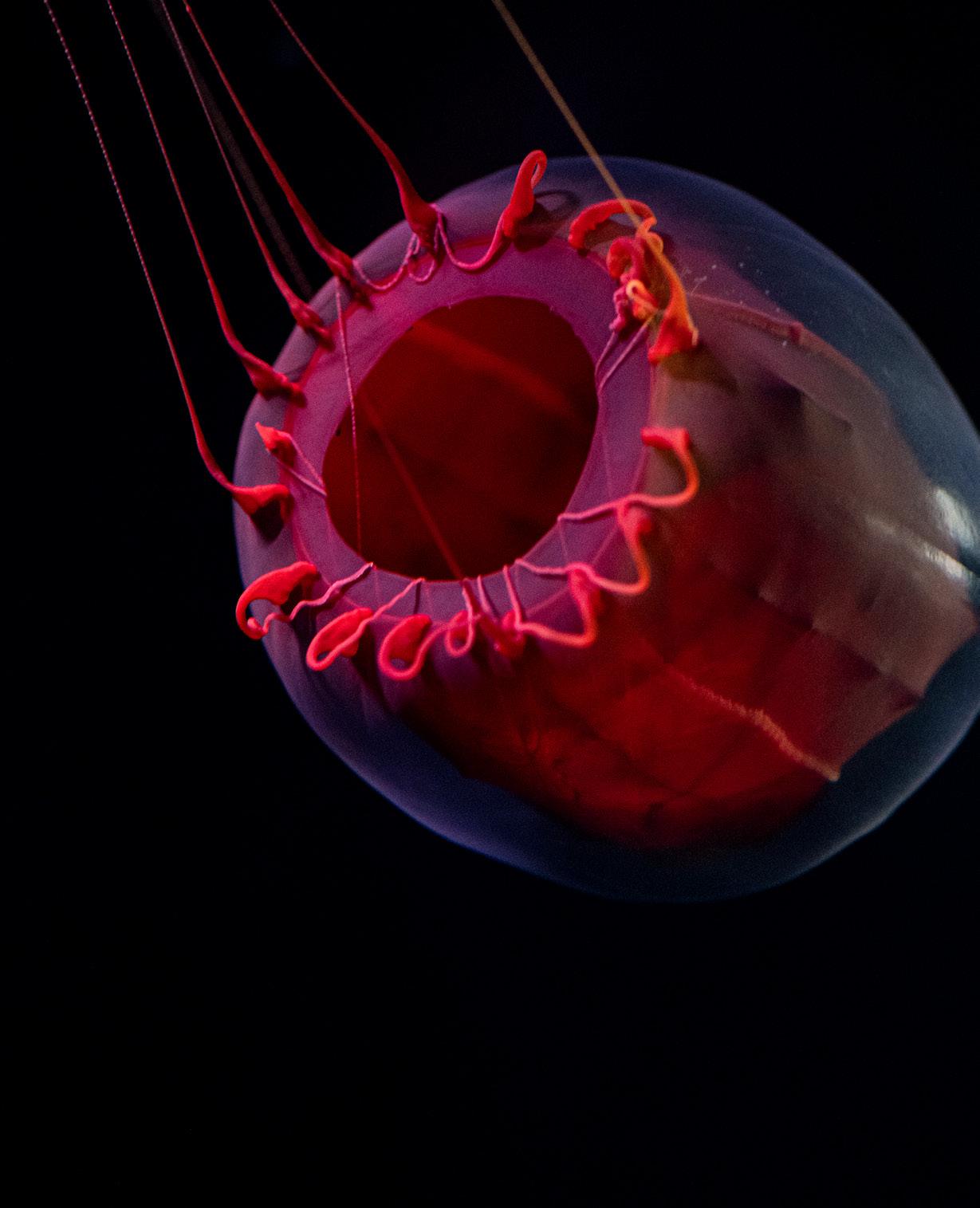
MONTEREYBAYAQUARIUM.ORG | 2022 ANNUAL
REVIEW
Red paper lantern jelly Pandea rubra
4
Opening Into the Deep
After more than five years of hard work and scientific breakthroughs in animal care, we opened Into the Deep: Exploring our Undiscovered Ocean/En lo Profundo: Explorando Nuestro Océano Desconocido in April. The trailblazing exhibition was developed in collaboration with our partner, MBARI.



Visitors have been delighted and inspired as they “descend” into the deep sea to learn about its diverse animals and ecosystems and the scientists studying this largest and leastexplored area of our planet.
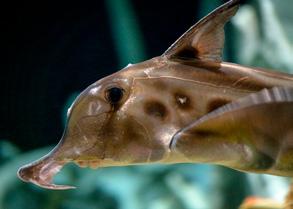

When we opened Into the Deep/ En lo Profundo in April, we hosted previews for donors and members. During one of the previews, Julie Packard welcomed members of the Leadership Council of the Packards’ Circle to the Aquarium.
Donors enjoyed an exclusive look at the exhibition and the opportunity to meet with staff responsible for developing it. They also enjoyed a free-flowing conversation between Julie and marine science pioneer Dr. Sylvia Earle about ocean exploration and protection.

MONTEREYBAYAQUARIUM.ORG | 2022 ANNUAL REVIEW
Japanese spider crab Macrocheira kaempferi
Donors got an early look at Into the Deep/En lo Profundo and some of the animals found there: (below) fire star Hymenodiscus sp. and elephant fish Callorhinchus milii.
5
Julie Packard and Dr. Sylvia Earle
Advances in care and culture of deep-sea species
Our animal care scientists continue to perfect techniques that advance what’s possible in care and culture of the enigmatic deepsea species featured in Into the Deep/En lo Profundo. They’re constantly monitoring, learning, improving, and innovating to ensure the health and well-being of the exhibit’s amazing array of deepsea animals. Many of the animals we’re exhibiting in Into the Deep — the bloody-belly comb jelly, deep-sea siphonophore, and barrel amphipod — are being displayed to the public for the first time ever.
Our team’s ingenuity has led to breakthroughs in raising and displaying such mesmerizing species as chandelier jellies and snow globe jellies, which are all found in the midwater region of the deep sea. These drifters are extremely delicate and require just the right water chemistry and temperature to survive. Innovation in animal care means we were also able to display salmon snailfish and some of the largest Japanese spider crabs in the country.
As unrivaled pioneers and leaders in caring for and culturing deepsea species, our team was the first to raise deep-sea siphonophores, which are strands of individual, jelly-like creatures that function as a single organism and play a huge role in oceanic food webs.
“Each question we ask takes us down paths we didn’t know were in front of us – repeatedly proving that there’s so much more to learn and so many boundaries to put behind us.”
— Megan Olhasso, Curator of Fish & Invertebrates
In future years, we’ll share discoveries we and our colleagues at MBARI make about the deep sea as we continue to increase understanding of the life cycle of deep-sea species and the incredible adaptations that allow them to survive in a dark, cold, and mysterious environment.

MONTEREYBAYAQUARIUM.ORG | 2022 ANNUAL REVIEW WE’RE INNOVATING FOR THE OCEAN
6
Siphonophore Nanomia bijuga
Pelagic magic
Through a unique combination of rigorous research and new animal care techniques, the Aquarium and MBARI, our research and technology partner, continue to lead the way in science and deep-sea exploration. Expeditions to this mysterious habitat have led to several amazing and rare discoveries about the lives of deep-sea animals, including the barreleye fish, highfin dragonfish, and several new species of jellies.
Working together, Aquarium and MBARI scientists deploy remotely operated vehicles into the deep, searching for animals both for new understanding and sometimes to bring back to the Aquarium for public display.
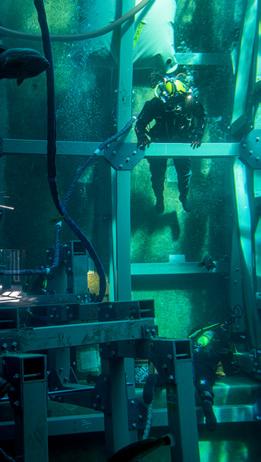
Our scientists also journey to Hawaii on blackwater dives, a form of scuba diving that takes place at night in the open ocean. Divers, tethered to a boat by a rope, descend up to 60 feet deep. In this dark and dreamlike setting, they wait for magic to materialize.
Thousands of deep-sea creatures migrate vertically twice a day — once to the ocean surface at night and back down to its depths at dawn. As they emerge from the darkness, our team learns more about deep-sea creatures and sometimes collects animals to exhibit in Into the Deep/En lo Profundo.
We’ll continue these expeditions so we can showcase new animals from this mysterious realm for years to come.
Engineering feats keep the Aquarium first class
With the Aquarium nearing its 40th anniversary, we’ve begun tackling some important infrastructure improvements. Working with talented engineering and design firms, we replaced rockwork in the Kelp Forest exhibit and began replacing the original supports for the Aquarium’s two seawater intake pipes. Both have been affected by water motion, seawater corrosion, and general aging over four decades.
Our signature Kelp Forest exhibit now has new rockwork that we installed without having to remove animals or seawater. To make way for the new, lighter rockwork, divers removed nearly 20 tons of the old material. For the first time since 1984, you’ll now be able to watch algae and invertebrates colonize the bare surface.
Two 1,000-foot-long intake pipes that reach out into Monterey Bay carry 2,000 gallons of seawater a minute to the Aquarium, allowing us to sustain our living exhibits. During a three-year project — which goes on hold during stormy weather — we’re replacing the original concrete and iron supports with a stainless steel alloy that resists seawater corrosion.
Using special technology, two divers spend up to eight hours a day underwater to do this critical work. The updated materials also mean we’ll leave a smaller footprint on the floor of Monterey Bay. The stronger but smaller new supports will be spaced farther apart than the ones they replace.
Both projects are part of the many infrastructure upgrades we’re making to ensure the Aquarium remains a preeminent institution far into the future.

MONTEREYBAYAQUARIUM.ORG | 2022 ANNUAL REVIEW
We collect deep-sea animals in Hawaii during night dives.
7
Scaffolding supports new rockwork.
Translation helps accessibility
Into the Deep/En lo Profundo is our first fully bilingual exhibit — in Spanish and English — for both in-person and online visitors. This helps ensure we’re accessible to an increasingly diverse audience — and can help families connect across generations around our exhibits and ocean conservation message.
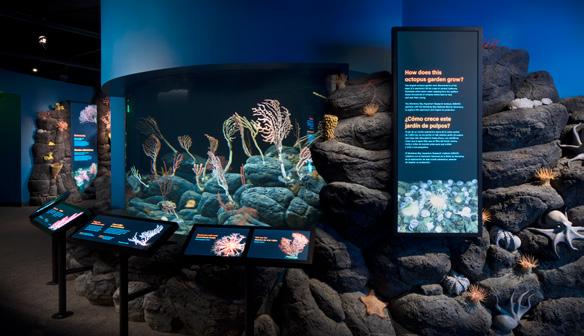

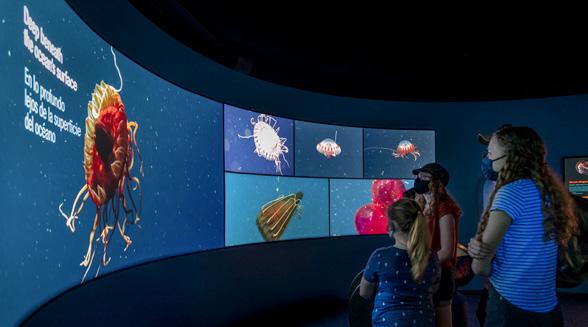

In 2022 we created a new team that’s responsible for consistent translation of our written materials, using a shared glossary to document precisely how Spanish names and frequently used words and phrases should be translated. It’s no simple task. Over the past 20 years, we’ve learned a lot about adapting descriptive language in ways that take into consideration overall meaning, voice, and tone. For common animal names, we also need validation by the scientific community.
Offering guests and students bilingual content ensures that language is a portal to understanding and connecting to the ocean — and not a barrier.
MONTEREYBAYAQUARIUM.ORG | 2022 ANNUAL REVIEW WE’RE INNOVATING FOR THE OCEAN
8
Visitors journey from the surface (top), through a video gallery of deep-sea life (middle), and past a community of deep-water corals (bottom).
Volunteers expand our reach
The Aquarium is fortunate to have a highly dedicated group of people who offer their energy, expertise, and enthusiasm as volunteers. They’ve been a foundation of our success since before we opened our doors.
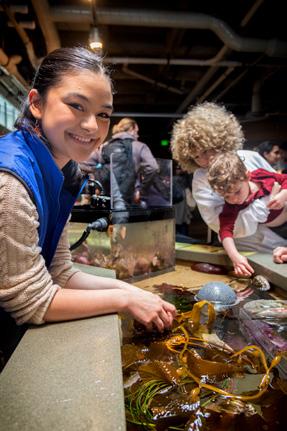


For our volunteer guides, this includes spending hours learning about “all things ocean” so they can share a wealth of knowledge, and countless stories, with our guests. Volunteers also bring their skills as divers to help keep our exhibits in tip-top shape, as educators who support our work with young people, and as biologists and conservationists who assist our research initiatives and Seafood Watch program.
Last year, a group of volunteers helped our partners at MBARI (Monterey Bay Aquarium Research Institute) on a National Science Foundation-funded project. They analyzed hundreds of hours of videos and images of ocean life with a goal of training computers to make correct identifications of what are now unlabeled images of ocean animals. The project will give scientists access to a treasure trove of biodiversity information that until now has been trapped in these recordings.
As we work to create an Aquarium that embraces diversity, equity, inclusion, and accessibility, we welcomed the most diverse group of volunteers ever in terms of age, ethnicity, race, and background. We also recruited our first group of volunteers on the autism spectrum. We’re thrilled to be breaking through generational, cultural, and accessibility boundaries to create a space where more people feel encouraged and welcome to make a difference as they share their passion for the ocean.
Recognition for excellence and innovation
Julie Packard received three awards in 2022 that recognize her longstanding leadership in transforming aquariums into champions for ocean conservation. The Association of Zoos and Aquariums (AZA) presented Julie with the R. Marlin Perkins Award — its highest honor for professional excellence. The Garden Club of America awarded her the Margaret Douglas Medal, recognizing Julie for notable service in conservation education. And she was named the first Visionary Innovator by California State University, Monterey Bay.
AZA also presented its inaugural 2022 Facility Award to the Bechtel Family Center for Ocean Education and Leadership for excellence in design and construction. And a team of AZA inspectors gave the Aquarium a perfect evaluation as part of our re-accreditation process. During their onsite visit they remarked on the cleanliness of the Aquarium — both in public areas and behind the scenes — our engaging and knowledgeable staff, our innovations in life-support design, animal husbandry, and exhibits, and the impact we’ve had on our many audiences. In short, they were blown away!
MONTEREYBAYAQUARIUM.ORG | 2022 ANNUAL REVIEW
9
Volunteers guide our guests, keep our exhibits looking great, and interpret our exhibits.
Nurturing future ocean stewards

MONTEREYBAYAQUARIUM.ORG | 2022 ANNUAL REVIEW
Aquarium visits provide an inspiring experience for thousands of visiting schoolchildren each year.
10
Free education programs have been a cornerstone of the Aquarium since we opened. Our commitment today is stronger than ever, as we offer new programs and relaunch others placed on hold during the pandemic. Enabled by your support, we’re welcoming students for free classroom visits, supporting emerging young leaders, and preparing new generations of classroom teachers for success. You’re helping us realize the full potential of the Bechtel Family Center for Ocean Education and Leadership.
Welcome back, students!
We were thrilled to finally welcome back thousands of students on free field trips after a nearly twoyear hiatus due to the COVID-19 pandemic. We also resumed our in-person Discovery Lab program where students get the chance to become scientists in one of the Aquarium’s Learning Labs.

Connecting to the ocean and to science learning has a dramatic impact that can change a student’s awareness about the kind of future that is possible for them. As students explore the Aquarium and come face-to-face with the amazing animals and ecosystems of Monterey Bay and beyond, they become excited about the natural world, science, and conservation. For many of them, an Aquarium field trip is their first visit to the ocean.
“The whole Aquarium is amazing and magical, so being able to offer ways for young people to experience that is everything.”
— Pamela Wade, Manager of School Programs

All of our Discovery Lab programs are tied to an actual exhibit at the main Aquarium, so nothing we teach is hypothetical.
Our goal in 2023 is to host 60,000 schoolchildren on a free field trip, getting closer to the number who visited before the pandemic. When field trips aren’t possible due to distance or transportation costs, we’ll continue to offer our live instructor-led Online Discovery Labs to reach those students.

MONTEREYBAYAQUARIUM.ORG | 2022 ANNUAL REVIEW
For some, this is a first-ever ocean visit.
11
Visits include structured learning activities.
Students innovate a more just environmental future
There’s a ceiling on the Innovation Lab, but there’s no barrier when it comes to the imaginations of students and teachers who use this amazing space in our Bechtel Family Center for Ocean Education and Leadership.
Like any classroom, it’s a place for learning. But it’s so much more. It’s an evolving piece of our nearly 40-year commitment to free education programs — a place where students seek solutions to environmental problems through an approach that emphasizes equity as well as innovation.
The lab promotes equity in the design process by helping teachers and students build empathy and design a solution with — not just for — their users. It also gives students and teachers the opportunity to go beyond a specific conservation issue to examine systems that give rise to the problem in the first place.


They create solutions to environmental problems.
For example, we might first support teens as they work together to build a composting bin for their schoolyard. Then we help them use the same process to address an underlying issue: reimagining the school’s lunch line systems so they generate less food waste to begin with.
We’ve incorporated the same approach in Designing for Equity, Community, and the Ocean, our newest yearlong teacher institute that we launched last year. The institute prepares educators and future educators to design an equity-focused, eco-centered maker project for their classrooms.
As we continue to ramp up our education programming, the Innovation Lab will play a key role in helping students and teachers shape a more just environmental future.
MONTEREYBAYAQUARIUM.ORG | 2022 ANNUAL REVIEW
Students have access to inventive tools such as this laser cutter.
NURTURING FUTURE OCEAN STEWARDS
12
Climate power
Talking about climate change can be anxiety-provoking. The facts can quickly become overwhelming, which can lead to paralysis — the opposite of the commitment to action we need if we’re going to address the daunting challenges ahead.
That’s why educators taking part in our second Climate Action Projects Summit learned how to foster resilience in kids — and adults – through a technique that helps process feelings that come with the facts.
During the summit’s keynote address last October, author and climate psychology educator Leslie Davenport shared researchbased resilience tools such as telling stories of hope and other positive neurofeedback techniques like the “doggy shake.” The technique helps release stress in our bodies so we can stay engaged in finding solutions. It’s a tool educators can take back to their classrooms.
Davenport’s address is one way the yearlong summit helps classroom teachers build their knowledge and confidence to teach about climate change and guide their students in identifying, designing, and implementing climate-related solutions.
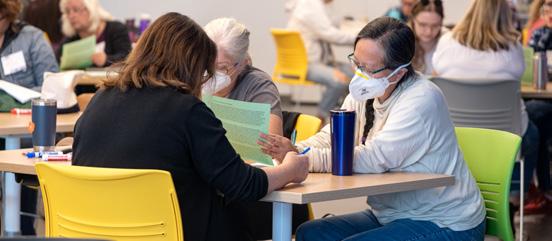
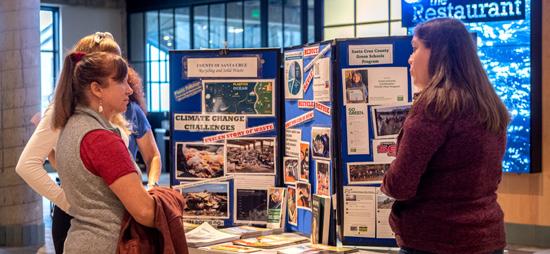

 Aquarium educator Beth Callaghan welcomes educators to the summit.
Aquarium educator Beth Callaghan welcomes educators to the summit.
MONTEREYBAYAQUARIUM.ORG | 2022 ANNUAL REVIEW 13
Leslie Davenport shares how to build resilience (top). Educators learn about climate change challenges (middle) and work together to develop projects for their students so they can make a difference (bottom).
Teen leadership inspires conservation

Inspiring teens and young adults to become global citizens — young leaders who have confidence, enthusiasm, and knowledge to address environmental challenges — is central to our mission. We can’t hope to manage the significant and growing threats to ocean health without a committed group of young people leading the way.
Key to our efforts is Teen Conservation Leaders — our flagship program for high school students. The program builds teens’ leadership, collaboration, and communication skills as they provide volunteer service at the Aquarium. Each summer, you’ll find more than 50 young people in our galleries and outside near the Great Tide Pool, interpreting our exhibits and ocean wildlife to visitors.
Our Education team also mentors alumni of our teen programs so they can deepen their commitment to ocean conservation. The results were on display in April when two alumni who were engaged in a yearlong internship — Annabella Aguirre and Hannah Browne — collaborated with a group of teens to plan and host a public event called “Fashion Without the Footprint” at the Bechtel Education Center.
The teens chose “fast fashion” because clothing manufacturing creates a high volume of clothing — and waste — in a short amount of time. During the event, visitors participated in hands-on activities focused on the concept of slow fashion. In contrast to fast fashion, slow fashion emphasizes starting with sustainable materials, reusing them, and recycling them into materials that can be used again.

MONTEREYBAYAQUARIUM.ORG | 2022 ANNUAL REVIEW NURTURING FUTURE OCEAN STEWARDS
Teens create projects to solve problems.
Having fun is also a key element of our programs for teens.
“It was eye-opening for a lot of people. We wanted everybody to know that participating in environmental issues is for everyone.”
— Annabella Aguirre, progam alumna
14
Growing connections with CSUMB
Shortly after California State University, Monterey Bay (CSUMB) opened in 1995, we developed a long-lasting partnership that continues to grow. We provide a free admission ticket to every CSUMB Otter (the sea otter is the school mascot) and welcome many as volunteers so they can complete the university’s mandatory servicelearning requirement.
Over the years, we’ve added new opportunities, including paid internships. For more than 15 years, we’ve hosted one-day workshops at CSUMB for student teachers, helping them learn how they can utilize cultural institutions like aquariums in their teaching. Our newest yearlong institute for educators, Designing for Equity, Community, and the Ocean, is part of a growing partnership between CSUMB’s School of Education and our staff.
“We’re partnering closely with CSUMB to prepare a new generation of teachers who look like the students they will be teaching. The socioeconomic and cultural diversity of the CSUMB student body makes it an ideal partner.”
— Jenny de la Hoz, Vice President of Education
In fall 2023, two high school graduates will receive the first scholarships we’re awarding through the George P. Shultz Future Leaders Scholarship Fund.
The scholarship — named to honor former Secretary of State Shultz, who passed away in February 2021 and was a former trustee of the Aquarium — will cover tuition at CSUMB, housing, and living expenses. The recipients will also receive mentoring from Aquarium staff as they prepare for and attend college.
Our growing connections with CSUMB are opening doors for a diverse group of young ocean leaders and strengthening our ability to inspire conservation of the ocean in people of all ages.



MONTEREYBAYAQUARIUM.ORG | 2022 ANNUAL REVIEW 15
We’re building a deep relationship with CSUMB, including research dives (top), alums joining our staff (middle), and programs for future teachers (bottom).
Meeting teens’ emotional needs
To support teens as they explore difficult environmental issues like plastic pollution, climate change, and threats to ocean biodiversity, we hired our first full-time Youth Development Instructional Coach. Andrew Clemente, a licensed school counselor, provides teens with time to process what they’re learning and helps them explore how they can be a part of the solution. He also helps teens navigate stress related to personal, family, and community struggles, including the persistent impacts of systemic racism on their lives.
In his new role, Andrew is helping to make mental well-being and social-emotional skills a central element of all our Education programs — whether for teens, younger schoolchildren, or teachers.
He’s also ensuring our education staff have the tools they need so they can provide emotional support to teens they work with, too.

MONTEREYBAYAQUARIUM.ORG | 2022 ANNUAL REVIEW NURTURING FUTURE OCEAN STEWARDS
Youth Development Instructional Coach Andrew Clemente
16
Opening doors for interns
We continue our commitment to providing stimulating opportunities so young adults can gain valuable work experience. For the past two years we have provided paid internships to encourage college students who are interested in conservation and marine-science related careers. The paid aspect of the internship is important for students who come from communities traditionally underrepresented in the sciences who may need to support themselves.

Last year, Martin Gil, a sophomore at Monterey Peninsula College, was an intern in our water science lab. He assisted our water quality team as they made sure the animals in our exhibits thrive. He also completed a project to help inform some of our veterinary procedures that take place underwater. His goal was to ensure a comfortable environment for animals receiving medical care.
“The internship provided me with hands-on experience I couldn’t get anywhere else in the world. Shadowing staff in different departments at the Aquarium built my understanding and appreciation for how complicated it is to keep exotic sea life healthy and thriving – from dissolved calcium in a coral tank to eye drops for sea otters.
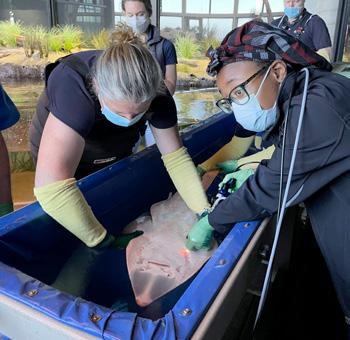
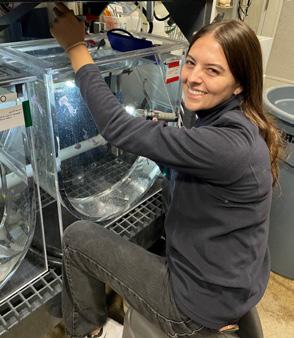
I feel more confident in the laboratory and in the field — as both a chemist and a scientist — because I was mentored by professionals in their fields.”
 — Martin Gil, sophomore
— Martin Gil, sophomore
MONTEREYBAYAQUARIUM.ORG | 2022 ANNUAL REVIEW
Veterinary extern Juhi Shah (at center) assists with sea turtle care.
Interns Martin Gil and Melina Cavett and veterinarian extern Imani Williams (right) provide valuable service as they gain knowledge of ocean science and animals.
17
Making global progress for ocean health
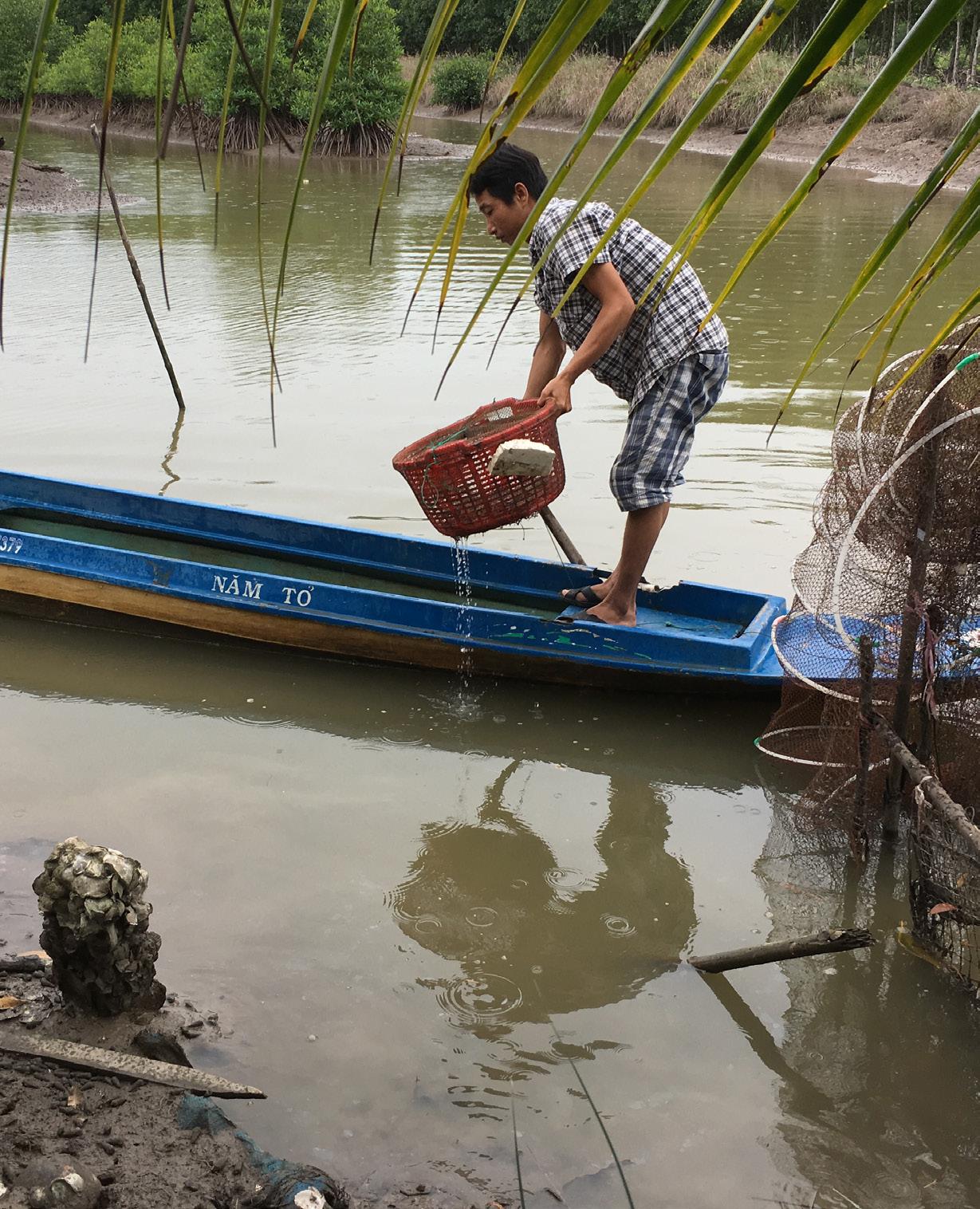
MONTEREYBAYAQUARIUM.ORG | 2022 ANNUAL REVIEW
A shrimp farmer in Vietnam
18
We championed laws and policies that will make a difference on top ocean issues from plastic pollution to the emerging threat of seabed mining. We documented the impact we’re having on sea otter recovery and showed how the climate crisis is affecting otters’ potential to make coastal ecosystems more resilient. Our global Seafood Watch program is using science and engagement with businesses, producers, governments, and consumers to transform seafood production — and improve the wellbeing of people who catch, farm, and process the seafood we eat.
A pivotal time to act on plastic pollution

Plastic pollution is a massive problem that grows larger every day. People around the world are confronting the crisis by demanding and crafting solutions for a more sustainable consumer economy.
We’re rising to this moment, with your support, by providing expertise on plastic pollution. And we’re advocating for policies to stop its flow into the ocean and our communities.
In June 2022, California enacted a first-in-thenation bill that will reduce plastic pollution and hold companies accountable for the waste they produce. The California Plastic Pollution Producer Responsibility Act, authored by Senator Ben Allen, is regarded as the nation’s toughest law regulating plastic waste.

The Aquarium played a major role in crafting this legislation and getting it enacted. We pushed for key provisions, including a mandate to reduce single-use plastic packaging by 25 percent by 2032, and our supporters sent 5,500 letters urging their California legislators to pass the bill. The Aquarium was recognized in top news coverage of the law, which is a model for policies in other states and at the federal level.
In December, the United Nations led talks for a binding international agreement to curb plastic pollution, with Aquarium Chief Conservation and Science Officer Margaret Spring participating as part of the International Science Council. Margaret also joined a commission of experts that’s assessing the human health hazards, and the related equity concerns, around plastic.
MONTEREYBAYAQUARIUM.ORG | 2022 ANNUAL REVIEW
“With a strong model in California and increasing urgency at the federal and global levels, 2023 is shaping up to be a year we make meaningful progress to reduce plastic pollution. To ensure this results in systemic change, we’ll need everyone in it together.”
Margaret Spring, Aquarium Chief Conservation and Science Officer
19
California Attorney General Rob Bonta presents Aquarium Chief Conservation and Science Officer Margaret Spring with a certificate recognizing her leadership on plastic pollution. Margaret chaired a committee of the National Academies of Science, Engineering, and Medicine that produced a landmark 2022 report on U.S. contributions to the global plastic pollution crisis and led the call for a U.S. national action plan.
California bill prevents mining in state waters
One thing we know about the deep sea is that we don’t know nearly enough about it. That’s why we sponsored a California bill to ban destructive mining of mineral deposits on the seafloor. The Seabed Mining Prevention Act, authored by Assemblymember Luz Rivas, prohibits seabed mining for hard minerals in state waters, from shore to three nautical miles out.
Assemblymember Rivas credits the Aquarium with leading on this issue. We helped write the bill, provided science-based testimony in support, and rallied a coalition of nonprofits and businesses behind it. The state legislature passed the bill unanimously, and Governor Gavin Newsom signed it into law last September. With this legislation, California joins Oregon and Washington, protecting the entire West Coast from the potentially devastating impacts of seabed mining.
This protection is important because the deep sea sequesters carbon, supports food webs that feed

billions of people, and nurtures a reservoir of life that could contribute to medical breakthroughs. All that could be lost if we rush to exploit mineral resources without understanding the consequences.
Around the world, there is growing pressure to mine the ocean floor for minerals. But mining risks the destruction of sensitive seafloor habitats, and sediment plumes pumped from mining vessels can harm animals in the water column. These risks come at a time when marine life is already under threat from climate change and numerous other stressors, including pollution and overfishing.
MONTEREYBAYAQUARIUM.ORG | 2022 ANNUAL REVIEW MAKING GLOBAL PROGRESS FOR OCEAN HEALTH
“The stakes are incredibly high. To prevent a catastrophic free-for-all, we need to make decisions that are informed by data, and not just the potential for short-term profit.”
— Julie Packard
Many animals, like this benthic octopus at Davidson Seamount, make their homes on the ocean floor.
20
Speaking out against
offshore oil and gas drilling
America’s coasts are home to remarkable marine life, from seabirds and whales to tiny plankton. These animals not only contribute to a healthy ecosystem; they also generate economic benefits from fishing, tourism, and recreation. Offshore oil and gas drilling puts nature, our economy, and our communities at unnecessary risk. It can also increase greenhouse gas emissions that drive climate change.
Supporting Pacific bluefin tuna recovery

We know from Deepwater Horizon, Exxon Valdez, and decades of oil spills off California’s coast that when it comes to offshore oil drilling, accidents happen — and when they do, they can be catastrophic.

Last summer, the federal government proposed to open 11 new areas for offshore drilling in the Gulf of Mexico and Alaska over a five-year period.
We spoke out against these new offshore oil and gas leases. A coalition of U.S. aquariums — and advocates like you — joined us in pushing back. Our supporters submitted almost 3,000 public comments to the federal government opposing new leases, supporting a healthy ocean, and protecting coastline communities.
Last August, we received some good news about Pacific bluefin tuna. The National Oceanographic and Atmospheric Administration reported that the population has significantly rebounded from historically low levels and is on track to recover to levels that can be sustainably fished. This outcome is a direct result of our years of research, market influence, and policy advocacy to recover this species, a key ocean predator. We supported the United States to become a champion for recovery and sustainable international management of Pacific bluefin tuna.
We now expect Pacific bluefin tuna to recover to sustainable levels in the next three years. If it does, it could be the first bluefin tuna species to attain a Seafood Watch yellow or green rating due to the management improvements we helped secure through international negotiations.
MONTEREYBAYAQUARIUM.ORG | 2022 ANNUAL REVIEW
Pacific bluefin tuna Thunnus orientalis are recovering.
21
Offshore oil and gas drilling puts coastal communities and ocean ecosystems at risk.
An equitable approach to seafood sustainability
Shrimp is enormously popular in the United States — but the way shrimp is farmed can harm the environment. Much of the shrimp Americans eat is raised on small family-run farms in South and Southeast Asia. Seafood Watch has rated most of these shrimp imports as Avoid (red) because of issues like overuse of antibiotics and habitat destruction.
Our global team has found that many farmers want to make improvements to their practices and gain access to the global sustainable seafood market. In some cases, farms are already operating sustainably but lack data to demonstrate it. Until recently, their options to prove their operations are sustainable have been limited. Third-party eco-certifications can be costly, and ratings programs generally function for entire regions rather than individual farms.
To make the process more equitable for these family-based shrimp farmers, Seafood Watch works on the ground with farmer associations, local companies, and other partners. We’re creating a pathway for small farmers to assure buyers of — and potentially improve — their environmental practices through a web-based app, the Improvement Verification Platform.
Seafood Watch team members who live in those countries train partners and farmers to use the app to determine if their farm’s performance is equivalent to a Seafood Watch yellow (Good Alternative) or green (Best Choice) rating. Using a landscape-level approach that samples a representative number of farms, we can confidently verify how all farms in an area are performing.
Our work is making an impact. In close collaboration with our partners in Vietnam, last year we substantially increased the number of small-scale shrimp farms that achieved green ratings — with many more slated to reach green in 2023. And after a successful pilot of the same platform in India last year, we are optimistic about improved practices there as well.
The results are a game changer for these rural communities. Through technical innovation, we’re leveling the playing field for family-run shrimp farmers in regions of Vietnam — and soon in India — to be recognized as sustainable and gain important access to global markets.


MONTEREYBAYAQUARIUM.ORG | 2022 ANNUAL REVIEW MAKING GLOBAL PROGRESS FOR OCEAN HEALTH
Giant tiger prawn Penaeus monodon
Shrimp industry members in Vietnam use the Improvement Verification Platform.
22
Working to improve human rights in the seafood industry
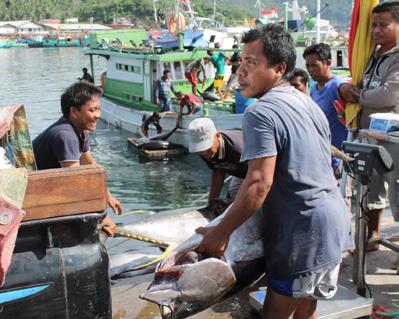
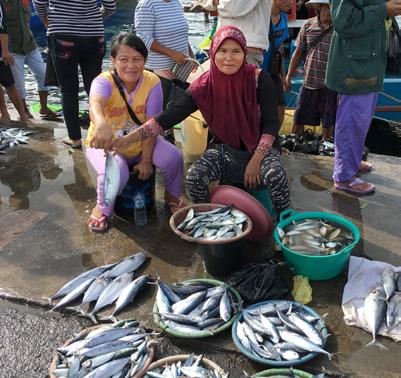

Seafood Watch is committed to transforming how seafood is fished and farmed so both people and the planet can thrive for the long term. To achieve this goal, we must ensure that sustainable seafood comes from fisheries and aquaculture operations that provide good and fair working conditions and respect human rights. In 2022, we made significant progress as we expanded our work on two fronts.
We formed a Social Sustainability Advisory Group to review and advise on integration of human rights considerations with existing environmentally focused work. The group of experts from 14 countries includes international researchers, human rights and social equity professionals, economists, and others. They are providing valuable strategic guidance and expertise as Seafood Watch works to ensure that the seafood we eat doesn’t harm the people who fish and farm it.
We also launched an updated and improved version of the Seafood Social Risk Tool for businesses. They can use this tool to better understand human rights and labor conditions in their seafood supply chains — and engage in efforts to improve them. The tool profiles seafood production systems around the world to identify areas that are at higher risk of forced labor, human trafficking, and child labor. Our aim: to encourage businesses to engage with producers and correct those abuses.
Harvesting shrimp at a small scale farm in Vietnam
MONTEREYBAYAQUARIUM.ORG | 2022 ANNUAL REVIEW 23
Fish market in Bitung, Indonesia
There’s sound science behind all Seafood Watch assessments
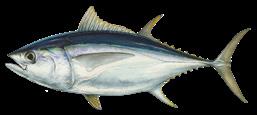
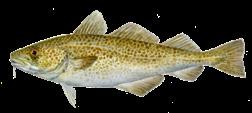
Seafood Watch has taken on a big job to assess the sustainability of fisheries and aquaculture worldwide. Currently we have released more than 1,640 ratings that cover 38 percent of global seafood production. Each year the number grows.
What goes into an assessment? Broadly speaking, for wild fisheries we examine all available public data against four criteria: Is the fish population healthy? What level of harm does fishing have on other ocean wildlife like turtles and seabirds? Does fishing the species harm its habitat? And, if it exists, how effective is management of the species? Based on the findings, we make recommendations, assigning each fishery a rating of Best Choice (green), Good Alternative (yellow), or Avoid (red). To assess aquaculture operations, we follow a similarly rigorous process.
Outside experts review each draft assessment, and we also make them available for public comment on the Seafood Watch website. Our goal is to assure consumers and businesses that our recommendations are based on an accurate reflection of the environmental impacts associated with seafood production.

Simply put, recommendations that come out red do so because they didn’t satisfy the sustainability standards of one or more criteria. But sometimes recommendations that come out red are unpopular.
For example, our fall 2022 assessment of American lobster in the Gulf of Maine scored fairly well around the health of the lobster population and impacts on the marine habitat. However, it scored very poorly on harmful
fishing gear impacts to other species — notably a high entanglement risk for the endangered North Atlantic right whale, and on management for not adequately preventing whale entanglements.
This resulted in a red rating. As with all our assessments, we’ll monitor this one for new developments and update our information accordingly.
We’ve seen in the past that our red ratings can spur innovations in the seafood industry. We’ve helped inspire — and are working with — the farmed salmon industry in Chile to commit to reducing antibiotics in their salmon farming, which pushes even more research toward finding a solution. In India and Vietnam, our tools are opening access to global markets for marginalized shrimp farmers. Perhaps most importantly, we’re guiding largescale seafood businesses toward more socially responsible outcomes by bringing everyone to the table to make inclusive and collective decisions.
MAKING GLOBAL PROGRESS FOR OCEAN HEALTH
Online Seafood Buying Guides
MONTEREYBAYAQUARIUM.ORG | 2022 ANNUAL REVIEW 24
Cod Bigeye Tuna
Antibiotics in aquaculture elevated to the global stage
Aquaculture plays a vital role in feeding the growing global population. Last year, for the first time, the United Nations recognized sustainable aquaculture as fundamental to achieve food security and support livelihoods. The recognition — made during the United Nations’ Our Ocean Conference held in Portugal — was the culmination of two years of hard work by our Seafood Watch team, as well as many other organizations, to elevate aquaculture to the global stage.


Antibiotics, which are used to control disease outbreaks in farmed salmon and shrimp — two globally popular seafood items — can harm ocean ecosystems. But banning antibiotics puts smallscale farmers in a bind as there are few, if any, cost-effective alternatives. And with climate change intensifying disease outbreaks, the time to act is now.
We continued our critically important on-the-ground efforts in Chile, Vietnam, and other countries. Our staff of global experts worked to increase understanding of how antibiotics impact marine ecosystems by engaging all stakeholders, from researchers to governments and small-scale farmers, to understand the issues they face as we work together to find solutions.
Our approaches are building trust and increasing support by stakeholders across the globe to find meaningful solutions for this important issue.
We work with the World Bank to promote sustainable solutions. Last spring, we hosted an online workshop for more than 50 global leaders. And during the United Nations Ocean Conference in June, Chief Conservation and Science Officer Margaret Spring moderated an event on managing antibiotic risks in aquaculture that featured a call for global collaboration to manage the risks.
MONTEREYBAYAQUARIUM.ORG | 2022 ANNUAL REVIEW
Josh Madeira, policy and stakeholder engagement director (left), and Rolando Ibarra, senior fellow aquaculture science and innovation, at the United Nations Ocean Conference.
Senior Fellow Rolando Ibarra presents on antibiotic challenges in aquaculture
“Connecting people, science, and solutions; that’s key to our success.”
25
— Seafood Watch Director of Science & Global Strategies Wendy Norden
Our sea otter surrogacy method is a model of success

A few years ago, Otter 845, a three-week-old pup prematurely separated from her mother, stranded on a beach in Davenport, California. State wildlife officials brought her to us, and we cared for her until she was old enough to dive for and eat solid food. We then paired her with one of our resident adult female sea otters, Ivy, who taught her the skills she needed to survive in the wild.
Once she was old enough to return to the wild, we released 845 in Monterey Bay. She foraged, rested with other otters, and settled into her home along the coast — all signs that Ivy had taught her well. Last summer, we spotted 845 with the most encouraging sign of all: a pup of her own — showing how our surrogacy program is helping support the recovery of the sea otter population.
The sea otter surrogacy practices we developed are the standard of care in the species’ rehabilitation. To expand surrogacy efforts, we’re sharing those practices with partner aquariums so they can use their facilities, staff, and resident sea otters to help us return more rehabilitated sea otters to the wild.
Today, southern sea otters inhabit only about 13 percent of their historical range, and the threatened population is struggling to expand beyond it. In July, the U.S. Fish and Wildlife Service (USFWS) released a congressionally mandated study on the feasibility of returning sea otters to areas they inhabited before fur traders hunted them to near-extinction. The study, which we played a significant role in developing, found that sea otter reintroduction along the U.S. West Coast is not only feasible, but
MONTEREYBAYAQUARIUM.ORG | 2022 ANNUAL REVIEW MAKING GLOBAL PROGRESS FOR OCEAN HEALTH
26
Our sea otter program by the numbers
Here is the impact of our program since it started in 1984.
Sharks, otters, and climate change
For more than two decades, Aquarium scientists and our partners have been using electronic tags to track white sharks. The resulting data told us more than we initially set out to discover.
Years since we rescued our first sea otter in 1984
Sea otters we have rehabilitated and released back to the wild
72
Non-releasable sea otters we’ve placed at 13 different U.S. aquariums and zoos
Pups reared through our sea otter surrogacy program
Pups born in the wild to surrogate-reared otters that we rescued, rehabilitated, and released (These are only the pups we observed — there could be many more.)
that it would also benefit species recovery, coastal ecosystem health, and coastal communities.
The USFWS report also highlighted the release of surrogate-reared otters as a key method of potential reintroduction efforts. By expanding our surrogacy program to other aquarium partners, we will collectively be able to raise and release many more orphaned sea otters, rebuilding the otter population in places they’ve been absent for more than a century. By doing so, we’re supporting the recovery of California’s coastal ecosystems — which, in turn, provide priceless natural services to humanity.
One surprising finding is that warmer ocean currents, driven by climate change, are drawing juvenile white sharks north into Monterey Bay. These young sharks sometimes take experimental — but fatal — bites of southern sea otters. That’s affecting the otters’ ability to return to more of their historical range along the California coast.
Aimee David, vice president of U.S. & California ocean conservation, wrote about these dynamics last October in a Los Angeles Times op-ed.
“It’s one more clear signal that climate change is dramatically altering ocean waters off the California coast,” she wrote. “As shifting ocean conditions expand juvenile white sharks’ geographic range, the ripple effects are altering fundamental relationships in coastal ecosystems.”
This new information on sharks’ range, along with other emerging climate science, is informing our plans for sea otter recovery — and our efforts to protect key habitats like kelp forests and eelgrass meadows in a changing ocean.
To ensure that sea otters receive the very best care, our staff have provided husbandry and veterinary training to 22 aquariums, zoos, and wildlife rehabilitation facilities.
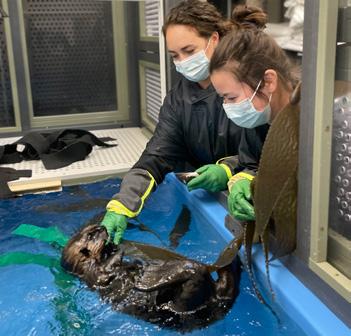
MONTEREYBAYAQUARIUM.ORG | 2022 ANNUAL REVIEW
43
262
82
38
27
Left: Aquarium Sea Otter Rehabilitation Specialist Kattie Stong trains Erin Lundy from the Long Beach Aquarium of the Pacific.
Thank you!
Your generous support enables the Aquarium to touch millions of lives and achieve remarkable results for our ocean planet. That was especially true in 2022. With operations in full swing after our extended closure, our entire team was excited to focus on new experiences and new programs to take our impact to the next level.

We opened Into the Deep/En lo Profundo, the most ambitious exhibition we’ve created since our Open Sea galleries. It was a milestone in our history and, for me, the fulfillment of a longtime dream. Our extraordinary team, plus an unprecedented collaboration with our colleagues at MBARI (Monterey Bay Aquarium Research Institute), enabled us to immerse people in the living deep sea that covers most of our planet, for the first time anywhere. My special thanks to the Grainger Family Descendants Fund both for the gift that let us complete Into the Deep during challenging times, and for their recent gift to ensure the exhibit continues to showcase the very latest in deep-sea discoveries.
The exhibition helped us attract over 1.8 million guests, a welcome return to numbers close to our pre-pandemic visitation. This includes the return of students for free field trips — the first since 2020. We hosted teachers for a new institute that emphasizes problem-solving and equity, and a summit that prepares them to lead students in climate action projects at their schools and in their communities.
We grew our Children’s Education Endowment Fund to secure funding and free access for these programs into the future, as we continue to fulfill the potential of the Bechtel Family Center for Ocean Education and Leadership.
The year also included big victories for ocean health. The Seafood Watch program’s sustainable seafood ratings continued to drive change across the globe, and the team — including a growing number of international fellows — was in high demand. Bolstering California’s leadership, we negotiated and backed the nation’s most comprehensive law reducing plastic pollution at the source. We co-sponsored a bill that bans seabed mining in state waters. And, our decades of work to recover sea otters revealed new insights into their role in supporting healthy ecosystems as communities plan to manage the growing impact of climate change.
Throughout the year, we continued our journey to become a more diverse, equitable, inclusive, and accessible organization, finding new ways to support the diverse voices that are essential to shaping solutions. We’re making accessibility for all a priority and supporting future teachers whose backgrounds reflect those of their students. Only by making these values and voices integral to our culture will we achieve our mission to inspire conservation of the ocean. I’m so grateful to you for making it all possible.
JULIE PACKARD Executive Director
MONTEREYBAYAQUARIUM.ORG | 2022 ANNUAL REVIEW
EXECUTIVE DIRECTOR’S LETTER
28
The Aquarium team has reached a number of exciting milestones this year, and I’m delighted to be a part of this amazing organization.
Coming out of two challenging years, we demonstrated not just resilience but incredible talent and a new determination to make the future of our ocean planet better. It started with the stunning living exhibits that are part of Into the Deep/En lo Profundo and included remarkable ocean policy victories to reduce plastic pollution and halt seabed mining in California waters.
For me, the energy and vision of our educators is one of the most meaningful highlights of 2022. The team, led by Vice President of Education Jenny de la Hoz, is rebuilding our programs and shaping a future where we can have a transformative impact on diverse new generations of young people. We’re also collaborating with California State University, Monterey Bay, to prepare a cohort of teachers who mirror the diversity of students in California.
The Connie and Bob Lurie Innovation Lab at the Bechtel Education Center is a vehicle for teaching problem-solving skills. Its programs embrace equity in the process of crafting solutions — an approach that puts communities at the heart of the process.
This reflects the work we’re doing — with the Board of Trustees, the Aquarium staff, and our volunteers — to build the inclusive organization we must become to continue advancing our conservation mission.
All this takes dedication and focus. These qualities exemplify the values that set Monterey Bay Aquarium apart. I and my colleagues on the Board of Trustees offer our deepest thanks for your generosity and support, which makes this important work possible.
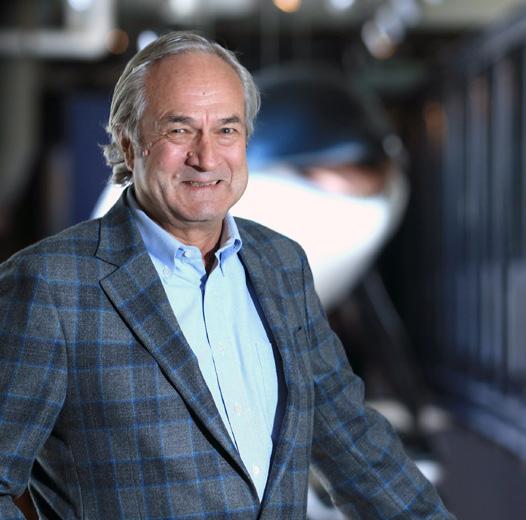 STEPHEN C. NEAL Board Chair
Julie Packard, Executive Director
Stephen C. Neal, Board Chair
STEPHEN C. NEAL Board Chair
Julie Packard, Executive Director
Stephen C. Neal, Board Chair
Tegan Acton
Meg Caldwell
Samantha Campbell
Caroline Getty
M.R.C. Greenwood
Mike Gupta
William Landreth
Michael Mantell
Connie Martinez
Martha Martinez
Susan Orr
Pietro Parravano
Chris Scholin
Greg Silverman
Louise Stephens
Mark Wan
Lisa White
Gideon Yu
MONTEREYBAYAQUARIUM.ORG | 2022 ANNUAL REVIEW
2022 BOARD OF TRUSTEES
BOARD CHAIR’S LETTER
29
Since we opened nearly 40 years ago,
the Monterey Bay Aquarium has made financial stewardship a top priority. Sound management of our financial resources allows us to achieve our mission to inspire conservation of the ocean. With your exceptional and generous support, we weathered the challenges of the pandemic and emerged in an excellent position to increase our impact for years to come. Thank you!
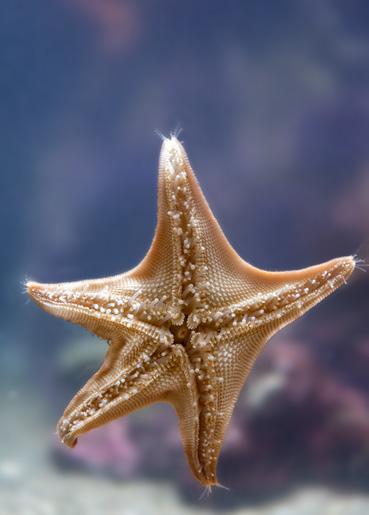
Revenue $139.4 million
$57.2 million Admissions
$46.6 million Contributions
$12.3 million Memberships
$10.7 million Endowment distribution
$7.0 million Other earned revenue
$5.6 million Retail and food services
Figures are preliminary and unaudited. Our 2022 Audited Financials and IRS 990 form will be available by November 2023 at: www.montereybayaquarium.org/about-us/financial-statements-and-annual-review
MONTEREYBAYAQUARIUM.ORG | 2022 ANNUAL REVIEW FINANCIAL INFORMATION
0 10 20 30 40 50 30
1,837,511 people of all ages visited the Aquarium 12+ million people connected with us online or engaged with our social media
2022 HIGHLIGHTS
22,777 schoolchildren and teachers took part in our free programs
81,426 animals and plants cared for by our staff 24/7
3,600 programs on ocean conservation and animals offered to the public 22 otters rescued who received care or rehabilitation by our staff
Direct expenses $95.9 million
$48.8 million Animal care & Aquarium experiences
$17.6 million Communications & outreach
$9.4 million Conservation & science programs
$4.1 million Education programs
$10.6 million Management & general
$5.4 million
Fundraising & membership services
Capital expenditures $29.2 million
36 seafood sustainability reports encompassing 182 ratings published 2 ocean-friendly bills we supported signed into law in California
As we near our 40th anniversary, the cost of maintaining our facility continues to grow, both due to age and environmental impacts. In 2022, we launched our amazing new exhibition Into the Deep/En lo Profundo, replaced rock work in the Kelp Forest, started a three year project to replace the pipe supports that bring seawater into the Aquarium, and completed several other critical infrastructure projects.
MONTEREYBAYAQUARIUM.ORG | 2022 ANNUAL REVIEW
0 10 20 30 40 31
Securing the future of the ocean

Each year, millions of people from around the globe draw inspiration from the Monterey Bay Aquarium and look to us to protect the ocean and its wildlife. Thanks to the generosity of our donors and members, we’ve been able to make a huge difference. But with threats to ocean health increasing, we must do more. That’s why it is essential that we build our endowment, so our programs can continue to make a difference, both now and in the future.
In 1996, we established the Aquarium’s Endowment Fund for the Future of the Ocean. It includes our Board-Designated Fund, and permanently designated contributions and bequests from donors. In 2011, we
Endowment Society members
created the Children’s Education Endowment Fund so we can always offer free Aquarium admission to California schoolchildren — something we’ve been committed to doing since opening day. We invest contributions made to our Endowment Fund, and each year we withdraw a percentage of the fund’s yield to fund our critically important programs.
At the end of 2022, our endowment reached $292 million and provided $10.7 million to support our free education programs for schoolchildren, teens, and teachers as well as our cutting-edge conservation and science initiatives that help ensure a healthy ocean — in perpetuity.
We are pleased to recognize our generous donors who joined the Aquarium’s Endowment Society with gifts of $100,000 or more. We are deeply grateful for their generosity and look forward to honoring a growing roster of Endowment Society members in the years to come.
Anonymous
Wallis Annenberg
Eugene Cheng, MD and Maribeth Colloton
Michael Dawson in memory of Audrey Dawson
Robert and Flora Day for the Day Nissim Family Fund
John and Jean De Nault
Richard G. and Mae F. Dong
Alan Feinberg and Joan Weber
M. Jean Fisher
Denise Foderaro and Frank Quattrone
Gill Family Trust in loving memory of Ravinderjit Kaur Gill
The Green Family
Charles E. Halfmann and G. Robert Yee
Wendy W. Kwok and Family
Douglas Lee and Kellee Noonan
William J. Lloyd in memory of W. Arthur and Eva L. Lloyd
Worth and Andy Ludwick
Connie and Bob Lurie
Jay and Susan Mandell
Dr. Hugh A. McAllister Jr.
John and Judith Mitchell in memory of Megan Liane Mitchell
Dean Morton
Lori S. Nye
The David and Lucile Packard Foundation
Pamela J. Pescosolido
Pomatto Family
In memory of Howard T. Powell
Purdy Legacy Foundation
Walter and Ramona Reichl
Jane and Chuck Rubey
Karl and Alice Ruppenthal Family Foundation
Charles and Helen Schwab Foundation
Robert and Janice Scott Foundation
Denise Littlefield Sobel
Curtis and Priscilla Tamkin
Suzanne Francoeur Taunt
The Terry Family Foundation
Leon Thomas and Betty Bird
Davis L. and Patricia M. Todhunter
Dr. Thomas Weber and Stephanie Reib
Alan Williams
MONTEREYBAYAQUARIUM.ORG | 2022 ANNUAL REVIEW
OUR DONORS
32
A lifetime of love for the ocean
Alan Feinberg and his wife Joan Weber — two generous supporters of the Aquarium — share a lifetime of love for the ocean. When they decided to leave a legacy that reflects their passion for protecting the marine environment, they selected us because of our reputation as a global leader in ocean conservation.

They were impressed by the Aquarium’s Endowment Fund because it supports our education programs, which foster interest, knowledge, and skills in marine biology and conservation. “Inspiring and educating today’s children and teens is vital to develop the next generation of ocean advocates who can carry forward the exceptional work that the Monterey Bay Aquarium is doing today,” says Joan.
To help support this important work, they created a named fund — making an outright gift now and a bequest from their estate that will add to the fund in the future. We are delighted to recognize the new Alan Feinberg and Joan Weber Endowment Fund for Education.
Leaving a legacy for the ocean
We are extremely honored by the loyalty and commitment of more than 800 members of the Betty White Ocean Legacy Circle. Their gifts in the future will be critical to securing a healthy ocean for future generations.

With deep gratitude, profound respect, and great sadness, we acknowledge the generosity of the following members of the Betty White Ocean Legacy Circle who passed away in recent years. Their legacy gifts will have a lasting impact on our work to inspire conservation of the ocean.
Geri Allison
Camille Arsenault
Paul Berg
Paul O. Brohmer
Daniel B. DeBra
Rita J. Donovan
Susan B. Draper
Tina Fairbanks
Renata Gasperi
Neil E. Harlan, Jr.
How to Create Your Own Legacy
Bruce S. Henderson
Adrienne S. Herman
Desmond Johnson
Barbara Kirchner
Robert and Lyn Leighton
Robert L. Propf
Patricia Raposo
Priscilla Upton
Jean Vernon
Leo Woods
If you would like to help build the Aquarium’s endowment fund and create your own legacy, please contact the Aquarium’s gift planning team at 831.648.4877 or by email at lastinglegacy@mbayaq.org
MONTEREYBAYAQUARIUM.ORG | 2022 ANNUAL REVIEW
Joan Weber and Alan Feinberg
Joan is a retired educator and Alan is a former software executive and nonprofit board chair. They relocated to the Bay Area from Boston in 1990 and will celebrate their 40th wedding anniversary this year.
33
Executive Leadership Council of the Packards’ Circle
The Executive Leadership Council of the Packards’ Circle recognizes individuals and family foundations that support the Aquarium with gifts of $100,00 or more annually.
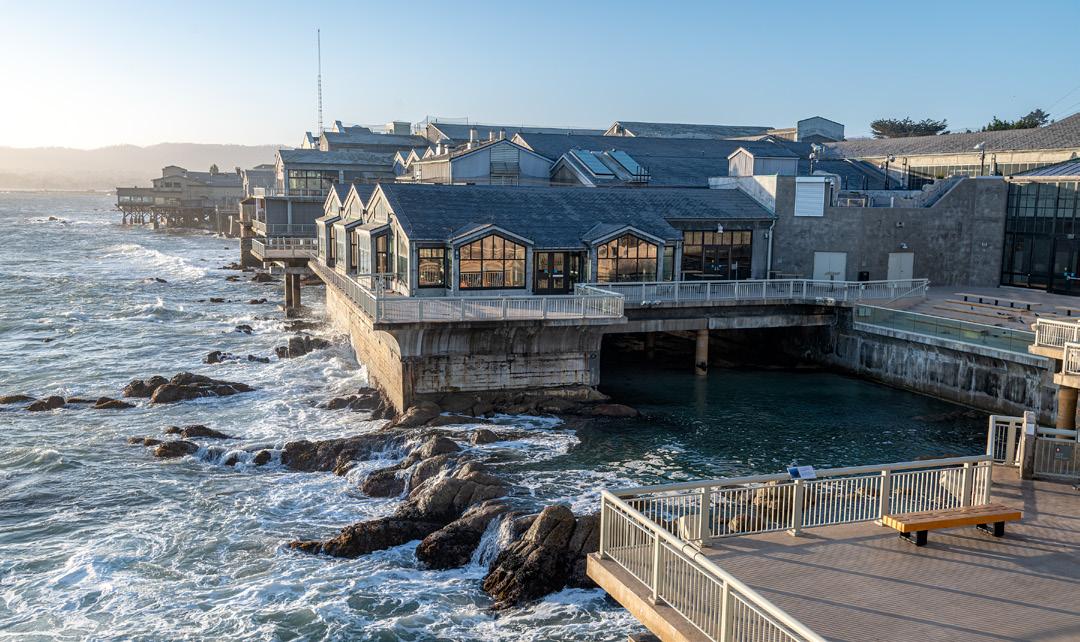
$5 million and above
Anonymous
An anonymous donor advised fund at The Chicago Community Foundation
Betty and Gordon Moore
The David and Lucile Packard Foundation
$1 million and above
Anonymous
Estate of Neil E. Harlan, Jr.
The Eric and Wendy Schmidt Fund for Strategic Innovation
Denise Littlefield Sobel
$500,000 and above
Connie and Bob Lurie
Janne and Bill Wissel
$250,000 and above
Anonymous
Acton Family Giving
The Keith Campbell Foundation for the Environment
Samantha Campbell
Jen-Hsun and Lori Huang
Eric C. Jensen and Teresa B. McCann
Estate of Betty White Ludden
Estate of Robert L. Ryon
The Siriwan Singhasiri and Kenneth Lin Foundation
$100,000 and above
Anonymous
Estate of Geri Allison
Cox-Vadakan Family
Dalio Philanthropies
Ann and John Doerr
DougDoug Community
Sharon and Joel Friedman
Mr. and Mrs. Franklin P. Johnson
Estate of Gary Daniel Kwan
The Landreth Family Fund*
Sally Lucas
Worth and Andy Ludwick
Leslie and Mac McQuown
The Priem Family Foundation
Estate of Joan La Marr Roach
Schlinger Family Foundation
Lisa and Matthew Sonsini Family Fund
Troper Wojcicki Foundation
Charles Wheatley
Lisa and Robert Wheatley
Anne Wojcicki Foundation
MONTEREYBAYAQUARIUM.ORG | 2022 ANNUAL
REVIEW
OUR
DONORS
34
We are exceptionally grateful to the following donors for their gifts received in 2022.
Leadership Council of the Packards’ Circle
The Leadership Council of the Packards’ Circle recognizes individuals and family foundations that support the Aquarium with gifts of $10,000 to $99,999.
$50,000 and above
Anonymous
Angela and Robert Amarante
Anonymous Fund of MCF
Estate of Ann Louise Brambl
The Buffett Fund*
The Cheng Family Foundation
Sandra DeLay and Carl Magnuson*
William H. Donner Foundation
Estate of Susan B. Draper
The Dunspaugh-Dalton Foundation, Inc.
Karen and Rick Hargrove
In memory of Adrienne S. Herman
The Dirk and Charlene Kabcenell Foundation
Maxwell/Hanrahan Foundation
Nora McNeely Hurley/Manitou Fund
Quest Foundation
Yuanbi and Paul Ramsay
Estate of Patricia Raposo
Pat Chandler Seawell
Windgate Foundation
Rebecca Winsor
$25,000 and above
Anonymous
Laura and Judson Althoff
Laura and Jesse Ambrose
Lyn and David Anderson
Ned and Jimi Barnholt
Mr. and Mrs. Richard Barrett
Currie and Tom Barron
Baugh Foundation
Johnnie and Peter Borris
Sheila and Michael Brand
Campizondo Foundation
Rebecca Castro
The William McCaskey Chapman and Adaline Dinsmore Chapman Foundation
Heidi Charleson and Lou Woodworth
Brenda H. Christensen and Thomas W. Barry
Anne and Terry Clark
Lesley and John Colgrove
Laurie and Alan Dachs
Flora and Robert Day
Margareta and Staffan Encrantz
Morgan Fein and Brandon Bianchi
Robert B. Fenton Family
Flora Family Foundation
Francis Family Foundation
Diané and John Furlan
Hope Giles and Jim Turek
Shirley and Harry Hagey
The Harvey Family
Frances Hellman and Warren Breslau
Estate of Bruce S. Henderson
William Knox Holt Foundation
Rachael and Justin Hugon
Chris, Kate, Stella and Erik Jaffe
Beth and Guy Kawasaki
Lakeside Foundation
Joan F. Lane
The McElwee Family
Peggy and Rod McMahan
Ana Mendez and Rajeev Jayavant
Mary Murphy and Mark Stevens
Dinny and Ned Nemacheck
Dian and Peter Nielsen
Kellee Noonan and Douglas Lee
Sabrina and Katie Poulos
Redwood Serenity Fund
Cori and Mike Roffler
Connie and Kevin Shanahan
Cheryl and Lonnie Smith
Mary and Mark Stevens
Stephen Storey
Barbara Swain
Suzanne Francoeur Taunt
The Terry Family Foundation
Darleen and Rolf Trautsch
Karen and James Tyler
Alec and Claudia Webster
Thomas Wolf
Brenda K. Wood
$10,000 and above
Anonymous
Kim and Wayne Anderson
Anthropocene Institute
Katherine Applegate
Alison and Joe Barta
The Baylor Family
Merle and Lorna Beghtel
Robert and JoAnna Behl
Roberta and Jim Bell
Barbara Benson
Helen and Peter Bing
Rebecca and Kirk Bocek
Carrie and Michael Bostock
RayAnn and Chris Bradford
Marianne and Donald Bradley
Fred and Susan Breidenbach
Ann L. Brown
Maria Cardamone and Paul Matthews
Wai and Glenda Chang
Zora and Les Charles
Donna Chiaro and John Cromwell
Laurie Christensen and Colin Ma
Bobbé and Robert Christopherson
Bud and Rebecca Colligan
Leanne and Michael Colvin
Joan and Edward Conger
Patrick J. Connolly Family
Gayle and Ron Conway
Crask Family
Tammy and Bill Crown
Nora Daly and Tim Linerud
Dauber Family
Susan and Richard Dauphiné
Denise and Gary David
Pilar and Lew Davies
The Dawson Family
Nina and Casper de Clercq
Barbara W. Deméré
Nancy and Bill Doolittle
Thomas and Marilyn Draeger
Dawn and Paul Drzaic
Marlene and Duane Dunwoodie
Patricia Duran
MONTEREYBAYAQUARIUM.ORG | 2022 ANNUAL REVIEW
35
Leadership Council of the Packards’ Circle, continued
Leslie Durboraw and Bill Maimone
Alex L. Dykes and Robert McClaine
Ria Eagan and Sue Stryker
Carol Eckert and Robert Day
Donald Ellis and Sherry Chang
Ken Endelman and Rosalind Van Auker
David, Sarah, Shaina and Hannah Epstein
Karen Erickson and Eric Rangen
Anthony Escalle Family
Judy Estrin
Alan Feinberg and Joan Weber
Estate of M. Jean Fisher
Richard B. Fullerton Foundation
Ursula Gallichotte and James Hallmark
Laura and John Gamble
Garcia Family
Kimberly and Jon Gavenman
Peggy Gennatiempo
Leslie and Kelly Gheen
Cindy Gilbert, David Greenstein and Chloe
Jaswant Singh Gill
Michele Goins
Myra and Drew Goodman
Stacy and Carl Gould
Christine and Stewart Green
The Greene Family
M.R.C. Greenwood
Marcella and Gary Gulmon
Katherine and Lance Gyorfi
Elaine and Eric Hahn
The Thomas D. Halaczkiewicz Foundation
Joanne and Arthur Hall
Bill Hannon Foundation
Christen Hanson and Ed Spurr
Karen and Brendan Harley
Alvin T. Harry and Emily F. Adelmann
Robert Hartmann and Denise Danisch
Mary and Roger Hayashi
Paul and Nancy Helman
Nancy and James Hoak
Deborah Hobbs
Chris and Greg Hoberg
Diane and Douglas Hockersmith
Hoefer Family Foundation
Betsy Hosick and Barb Peterson
Marcia and Larry Hulberg
Shawn and Tracey Hurley
Kathy and Bob Jaunich
Sharon Johe
Estate of Desmond Johnson
Kristine Johnson and Tim Dattels
Marguerite and S. Allan A. Johnson
Neil and Stephanie Johnston
Kathryn and Eliot Jordan
Alycia and William Kennedy
Doehee Kimm and Peter Lee
Caroline and Ken Knapp
Thomas V. Kornei
Joe and Nancy Kovalik Family
Caron and Alan Lacy
Pat Landers
Alida and Christopher Latham
Carol and Don Laucella
Sandra Laughlin
Aida and Bruno Lecointre
Leifhelm Foundation
Vencent Liang
Mary and Bob Litterman
Edmond D. Lock
Kathryn and Jim Lodato
Sharon Lohbeck
Karen Lovejoy
Jody Lyons and Gary Gallagher
Melody and Chris Malachowsky
Gerda Marotta
The John R. Marron Fund*
Patty and Eff Martin
Vicki Mayberry
John and Charlotte McConkie
Peter and Joan McKee
The McMurtry Family Foundation
Victor Merlino
Donna E. Meyers and Roberta S. Hunter
The Betty Millard Foundation
Nadine and John Mills
Robert and Mary Ann Moore
Susan B. Moore and Larry E. Moore
Morgan Charitable Foundation
Chrissi and Mike Morgan
Shara and David Morishige
Dean Morton
Nancy S. Mueller
Yvonne and Robert B. Muzzy
Sally and Craig Nordlund
Lori S. Nye
Tama and John Olver
Susan and Lynn Orr
Anne Pattee
Carrie and Greg Penner
Betty-Jo Petersen
Roxanne and Alex Petruncola
Pisces Foundation
Mary K. Powell
Lynn J. and Wayne H. Preston
Estate of Robert L. Propf
Debbie and Mike Pung
Purdy Legacy Fund
Kathy Reavis and David Strohm
Martha and Frank Rebagliati Family
Stephanie Reib and Thomas Weber
Sandra and John Reilly
Linda G. Rhodes and Victoria A. Dahl
Jancy Rickman and W.J. Michaely
Kathi and Larry Ridley
Catherine A. Rivlin and Robert L. Jones
George and Jane Roach
Beth and Bill Roberson
Robert and Florence Slinger Fund*
Leigh and Eddie Robinson
Alissa and Marc Rogers
Roschke Family
Rossi Family Foundation
Antti-Veikko Rosti and Judy-Ann Rosti
Jane and Charles Rubey
Mandy and Daryl Salm
The Schink-Knowles Family
The Schmitz-Fromherz Family Fund
Carol H. Schneider
MONTEREYBAYAQUARIUM.ORG | 2022 ANNUAL
REVIEW
OUR DONORS
36
Leadership Council of the Packards’ Circle, continued
Lee Schubert and Jed Hepworth
Erik Schutter
Jan and Bob Scott
Jeanette B. Sechrist
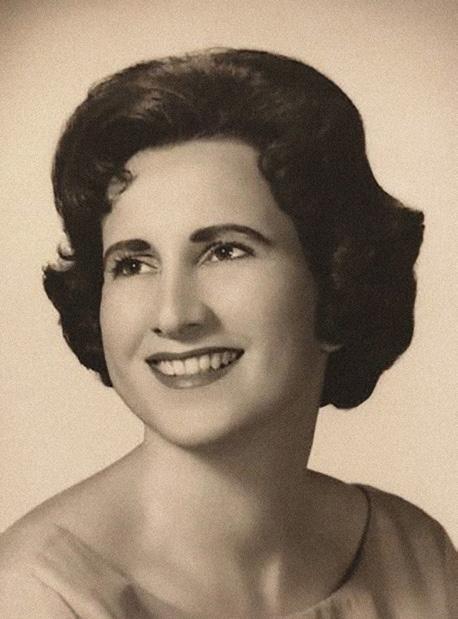
Michelle and Cliff Shedd
Sherry Shepardson
The Patrick and Alicia Shepherd Family Trust
BJ and NL Shipman Family Foundation Fund at the Community Foundation of Northern Nevada
Pamela Silver and Jeff Way
Amanda and Gregory Silverman
Tracey and Robert Simpson
Rod Skinner
Patricia M. and William H. Smith
Kathryn Snyder and Gerald Kutchey
George Somero and Amy Anderson
Candis Stern
The Storkan Family
Ginny and Richard Strock
Cindy and Caitlin Stuewe
Kathleen Talbert-Hill and George Hill
Anne and Peter Thorp
Yvonne Thorstenson and Brian Strom
Joshua Tidsbury and Nahanni Riversong
Donald and Denise Timmons
Patricia and Vincent Tinto
Davis L. and Patricia M. Todhunter
The Traverse Foundation
Dylan and Ryan Turzak
Pamela and Brian Uitti
James Vanlandingham
Ann and James Verhey
Franca and Rick Voeglin
Wanda and Harold Wake
Jeanne Ware
Mr. and Mrs. James Warren
Kathleen A. White
Sarah Bonner championed the Aquarium and Monterey County
We mourn the passing of Sarah Bonner, a member of the Aquarium’s board of trustees from 1997 to 2003. For more than 45 years, Sarah devoted her time, energy, and generosity to ensure a thriving Monterey County. In addition to serving as a trustee of the Aquarium and longtime champion of our mission, Sarah was instrumental in directing grant funding to Monterey County for critical education, health and human services, and arts and culture initiatives through her work with the William McCaskey Chapman and Adaline Dinsmore Chapman Foundation and the Dunspaugh-Dalton Foundation.
Brayton Wilbur Foundation
Wild Thyme Fund at Schwab Charitable
Alan Williams
Marti Williams
The Woo Family
Valerie and John Wookey
Linda and Koichi Yamaguchi
Warren Yang and Jung Yoon
Bill, Zack and Carol Fulton Yeates
Roslyn Young and Dave Johnston
D4 Yuhasz
Judi and Dave Zaches
Marsha McMahan Zelus
Patsy and Bob Zollars
Marcin Zukowski and Anna Chmielowiec
MONTEREYBAYAQUARIUM.ORG | 2022 ANNUAL REVIEW
IN MEMORIAM
37
Packards’ Circle
The Packards’ Circle recognizes individuals and family foundations that support the Aquarium with gifts of $2,500 to $9,999.
$5,000 and above
Anonymous
Judith and George Abbott
Joy and Jonathan Alferness
John Ameling and Susan Charbonneau
Dorothy and Steven Anderson
Ariko Family Foundation
Gayla and Gordon Armstrong
Nola and Harvey Armstrong
Carol Atkinson and Bob Silva
Kathleen and John Ballard
Sue and John Ballard
Charles L. Barndt, Jr.
Elizabeth and John Barron
Richard Baumgartner and Elizabeth Salzer
Jessie and Travis Becker
Sydney and Robert Bennion
Mary and Rudy Bergthold
Robin Berry and William Ringer
Fred and Jan Betke
Perry Bishop Family
Paula Black and Laura Zehm
Amy Boles and Kyle Wagner
Caasi Bonura and Jeremy Goodland
The Borch Family
Vreni and Willy Borner
Barbara and Max Boyer
Patty and John Brissenden
Linda Joanne Brown and Lauren Katherine Morlock
Marjorie R. Bullock and Nina S. Harrison
Charles and Margaret Burback
Susan and Peter Canepa
Lesley and Brad Canfield
Patti and Dan Canouse
The Cantacuzene Family
Jean Y. Caravalho
Mr. and Mrs. Susan Casentini
Patrick Chambers and Kathleen Winters
Janice Chan and Eric Kwan
Sanjay, Sushmita and Monica Chanda
Linda and Randall Charles
Brian K. Childress
Victoria Christie
Nina Ciminelli-Hill and Joe Hill
Tina, Joseph and Christopher Clark
Sandy and Shaun Collard
Pamela and Rachel Conant
Marsha and James Condon
Peggy and Yogen Dalal
James Day
Catherine and John Debs
Linda and Ed DeMeo
Laura Desmond-Black and Steven Davidovitz
Lee and Mary Alice Dickerson
Mary Dixon and David Jessup
Richard G. and Mae F. Dong
Phyllis J. Dorricott
Christina Drake and Timothy Thompson
The Ducommun and Gross Family Foundation
Jean and Jim Duff Fund*
Charlene Etheridge
Chuck Baxter helped shape the Aquarium’s vision
We honor Chuck Baxter (second from right), one of the four visionaries who first imagined a Monterey Bay Aquarium and influenced the scope of MBARI. The marine ecology expert, who died in August 2022, shaped the unique vision that continues to define the Aquarium: amazing live exhibits and a spirit of curiosity and wonder.

MONTEREYBAYAQUARIUM.ORG | 2022 ANNUAL REVIEW
OUR
DONORS
IN MEMORIAM
38
Packards’ Circle, continued
Sonja Fagan and Andrew Edelsten
Shannon and Ted Farrell
Susan Fisher
The Fraenkel Family
Alison and Jerry Frey
Gerald Fritz
The Galloway Family
Jody and Nancy Gerstner
Karen and Chuck Gill
Bettina and Michael Gilligan
Mark Goines and Gail Wong
Marcia and John Goldman
Loren and Mike Gordon
Steve Gorski and Mary Walsh-Gorski
Kevin, Martie and Al Graf
Keith Gress and Amy Peirce
Ruth M. Gupta
Tia Haapasalo and Jaakko Haapasalo
Ann P. Haberkorn
Barbara and Dick Haiduck
Eileen Hamilton
Ruth and Ben Hammett
Lorraine and Noble Hancock
Jillian and Jeff Harrell
Lynn C. Hart
Caroline Hicks
Robin and Deborah Hicks Family
Paula J. Higgins
Stephanie and George Hines
Lynne Hipp
The Hobson/Lucas Family Foundation
Susan and David Hodges
Tom B. Housen
Aditi Iyer
Julia Jackson
Christine and Michael James
Johnson Ohana Foundation
James Clinton Jones, MD
Linda Joost and Larry Fruzzetti
Dianne and Brian Judd
Teresa and Brian Kelleher
William A. Kerr Foundation
Julie and Ralph Kimball
Mary Ellen Klee
Toni Knudson and Kishore Augustus
Koehler Mahlstedt Family Foundation
Eileen Kopec
Dana and Sharon Krone
The Lafayette Family
The Cathy and Dick Lampman Foundation
The Lauesen Family
Mike Light and John Lum
Aren and Paul Lindstrom
Shirley and Darren Litzinger
Lee Litzler and Lylia Needham
Terri Lundberg and Arnold Whitman
M.O.B. Family Foundation
Glenice and Steve Magee
Pirkko Marja Maguire
Michael and Maxine Mantell
Lars and Marin Mapstead
Gene and Daneen Matts
Sue McCloud
Robert McGriff
Carolyn and Phil McIntyre
Morna Mellor
Richard and Grace Merrill Fund*
The Messer Family
Carol and Bryan Miller
Cynthia D. and Forrest E. Miller
Gail Morey
Catherine and Robert Murphy
Natalie Nielsen and Tom O’Brien
Ann and Roger Noll
Julie and Will Obering
Betty Ohr
Therese and Donald Olker
Judith Olson
Kris and John Olson
Sheila Ortloff
Laura and Kevin O’Shea
Parallax Art Studio
Sigrid U. Pate-Butler
Virginia Pauksta
Janet and David Peoples
Joyce Perkins
Ernest and Irene Pestana
Janet and Bert Peterson
Donna and Eric Prebys
Kenneth Prevette
Penny and Peter Purdue
Kelley and Brandon Reher
Ramona and Walter Reichl
Ann and Kanwal Rekhi
Alexandra Grace Rennie
Georgia and Tim Riley
Alice L. Roberston
Craig and Laurel Robertson
The Manette and Steve Rogers Family
The Rorer Foundation
Lori and Tom Rowden
Nancy Ruskin
Virginia and Gary Russell
Alisa and Rob Sakowitz
The Schleyer Foundation
Sara and Patrick Schmitz
Eileen & Fred Schoellkopf Foundation
Steve Schramm and Diane Schweitzer
Sheri Shipe and Heather Lee
Julie and Lance Shirai
Cindy and Richard Silver
Judith Sklar
Dennette, Joel, Trent, Leslie, and Colby Smith
Gary Sorgen
Rachael Staudt and Douglas Soo
Regina and Dieter Stoeckel
Sabina Stoltz and Aaron Thornton
Robert Sullivan and Meg Best-Sullivan
Ram Sundaram
Cheryl and Adam Sweeney
Janet H. Tague
Lisa and Bradley Tank
Colleen Tate and Erin Levins
Jennifer Taylor and Phillip Trujillo
Dianne L. and Robert Tecco and Family
Jeffrey Tindall
Marion Trentman-Morelli and Robert Morelli
Karen and Jim Truettner
Jennifer and Shawn Underwood
LaDonna Valenti
Estate of Jean Vernon
Celia Vigil and William Galcher
Connie and Robert Waldrop
Paul Webb Charitable Fund at the North Valley Community Foundation
The Weber Family
MONTEREYBAYAQUARIUM.ORG | 2022 ANNUAL REVIEW
39
Packards’ Circle, continued
Kim and Norm Wesley
Nancy and Hugh Westermeyer
Hollie Wilent and Carl Sutton
Michael and Kim Wilkins
Shelly and Stephen Wilson
Linda and King Won
Frank Wong
Carrie and Cliff Woolley
Kim Worsencroft and Dennis McEvoy
Douglas Wreden
Daunelle and Weldon Wulstein
Ayse Perihan and Mete Yalcinkaya
Charlotte and Erez Yarkoni
William York and Shawn Lampron
Mary Yui and Jeff Longmate
$2,500 and above
Anonymous
Joyce and Joseph Abbate
Grace M. Abbott and Mike Voss
Jeanette and William Abbott
Larry S. Abitbol Family
Susan and James Acquistapace
Janet and Chuck Adams
Dr. Scott Adams and Mr. Michael Lentz
The Aikin Family
Ron and Julia Allen
Carolyn and David Amaral
Julie and Derek Anderson
Robin and Ken Anderson
Rob Arathoon and Philippa Norman
Charles and Ronni Arduini
Marlene and John Arnold
Jered Arquiette and Quynh Pham
Peggy Aschenbeck and Al Giles
Avila-Soares Family
LaNae and Rick Avra
Kathy Ayers
Laura and Harrison Bachrach
Robert Baigrie and Linda Conway
Debbie and Paul Baker
Margot and Tyler Baker
Richard Bakman
Betty and Paul Baldacci
Lea and James Baldacci
JoAnn and Robert Balzer
Christine and Thomas Banks
Debra and Richard Barth
Stephen Bartlett
Lourdes and Neal Bassett
Ellen Beasley and Kevin Baker
Alex Beckman and Valerie Lau
Victoria Behr
Rhonda and Tim Bekkedahl
Susan and Steven Bell
Christopher Berg
Lynette and Richard Berg
Lynn Dee Berger
The Beutler Family
Theresa and Larry Biggam
Penny Blake
The Blau Reeves Family
Charlene Boarts
Cindy and Carl Bock
Betty Boege
Lucia and Michael Boggiatto
Christann Bohnet and Louis Bermingham
Barbara F. Borthwick and Marilyn A. Steinhart
Craig T. Bowman and Susan M. Schoenung
Lauren and Darrell Boyle
Michelle Brodale and Rich Hall
Susanne and Chris Brokaw
Shari L. Brooks and Clara E. Lee
Ginger Brown and Thomas Savarino
Jack Brown and Sylvia Ascencio-Brown
Rodlyn Brown
Shirley Brown and Judith Taylor
Bishop Tod D. Brown
Judy and Robert Brust
Madelyn Burke and John Nooyen
Ira Burkemper and Christine Drage
Janet and Mark Calhoon
Araceli and Daniel Camarillo
Janina and Steven Campbell
Jessica Canning
Maria and Walter Cannon
Hannah Cao and Victor Osimitz
Lois and James Carwin
Jose Castellanos and Carmen Cortez
Dr. Anthony and Clare Cedolini
Ms. Pearl Chan and Ms. Margaret Chan
Judy and Joe Chappell
Sue and Al Char
A. M. Chavez
Anita and Edward Chavez
Chennavasin Family
Susan and Steven Cheu
Eugene Cheung and Jennifer Logue
Michelle Chiang and Marcia Glover
Lisa and Mike Chun
Joyce Chung and Rene Lacerte
Susan Churchill and Van Tunstall
Catherine Cisternino-Thompson and Hannah Thompson
Alli and Dave Clark
Connie and Mike Clark
The David C. Clark Family
The Michal Clark Family
Robin Clark and Mary Mackiernan
Lisa and Michele Coddington
Aileen and Ron Cohen and Family
Sarah and Roger Coit
Mary Ventimiglia Colburn
Jeannie Cole
Paige Coleman and Walter and Greta Liu
Dr. Curtis Collins and Mrs. Judith Collins
Sarah Comstock
Cheryl Connolly
Jen Cooper and Ryan Rapetti
Jake Dolev Cooperberg and The Mocha Fund
Tim and Kelly Coppedge
Joann and Ivan Cornelius
Gerald and Buff Corsi
Brian Cox
Judy and Larry Crowder
Dr. Ela Cudilo and Mr. Dean Martindale
MONTEREYBAYAQUARIUM.ORG | 2022 ANNUAL REVIEW
OUR DONORS 40
Packards’ Circle, continued
Renee and David Cullinan
Chris and Ty Curry
Cynthia Curry and Bjorn Nilson
Ellen and Joffa Dale
Jenipher Dalton and Jim Feder
Pamela D’Amato and Danielle Leung
Dr. Lisa Damico-Beyer and Dr. Joseph Beyer
Iris and Stephen Dart
Chitralekha Dasgupta and Ronald Hamada
Julia and James Davidson
The De Berti Family
Angela and Michael De La Rosa
Paul and Linda DeBruce
Tina and Michael Declerck
Norine DeGregori
Madeleine Delman and Jerry Cohen
John Demme
Gabrielle Dentraygues
Barbara and Ronald D’Ercole
Susan and Ujesh Desai
Denise Devereaux and Steve Sharpe
Justin Devine and Ashley Wayland
Mira and Jeffrey Dick
Marla Dierkes and Kirk Hargreaves
Susan F. Dinwiddie
Lanaya and Gary Dix
Laurie and Roberto Dixon
Kathleen and Richard Doerr
Joseph W. Donner III
Patricia and David Dormedy
Martha R. Dorn and John D. Scandling
Linda Dotson and Andrew Forster
Hallie Mitchell Dow and Brad Dow
Connie and Mike Dowler
Karen and Phil Drayer
Kristin and Friedrich Drees
Mikila and Connor Duke
Kathleen and Eric Duncan
Susan M. and Ronald W. Duncan
Wendy and Stefan Dyckerhoff
Linda and Steven Eaton
Priscilla and Bill Eckert
Erin and Brian Edem
Patricia A. and Walter W. Edwards
Ryan Egan
Jody and Mike Elliott
Nicole Elliott and Jeffrey Brown
Susan and John Elliott
James Emerson
David Endo
Claire and Paul Enea
Sandra Eng-Caulfield and Thomas Caulfield
The Engel Family
Kim Engstrom and Linda Shields
Marcella and Frank Ettin
Meg and Keith Evans
Elijah Ezeji-Okoye
Kitti and Jon Fanoe
Jack Farr
Constance E. Farrar and Kimberly A. Duke
Belinda Farrell and Jim Craik
Weyland Fat and Luanne Morikawa
Jeanne Felber and Ricky Suemori
Aileen Fell
Benjamin Fennema and Joice Chan
Laura and Rick Fergerson
Elizabeth and James Ferguson
Nancy and Michael Ferraro
Michele and Benjamin Finch
Karen Fisbeck and Jeromy Rutter
Milissa and Jeff Fisch
Michelle and Sean Fitts
Candace and Lee Fleming
Peter Fogliano and Hal Lester Foundation
T. J. Forsyth
Darlene Forsythe-Beacham and David Beacham
Ian Fox and Chun Tsai
Kent Frame and Family
Kathy and Kyle Frandle
Karen and Bill Frederick
Susan French and Robert Hassing II
J. Stewart Fuller
Dorothy Furgerson and Carrie Reid
Mary K. and Edward J. Gallo
Karen Garafola and Michael Murray
Richard Garner
GAT Family Foundation
Candace and Vincent Gaudiani
Frances Gaver
Sam Gelpi and Ingbritt Christensen
Amy Geng and Todd Park
Linda Giampa
Holly Giles
Terry Gladek and Joseph Hingston
Cheryl Glick
Janice and Mel Goertz
Linda and Mark Golan
Kathleen and James Goldsmith
Philip Goldstone and Heidi Hahn
Neil Goodhue
Pria Graves and George Koerner
Sue and Ken Greathouse
Lynsie and Andy Gridley
Pamella Gronemeyer and C. Stephen Kriegh
Alma and Ronald Gross
Carolyn and William Gross
Gularte Family
Michele and Brian Gustafson
Mimi Hahn and Larry Warcken
Enis and John Hall
Jesse and Heather Hall
Linda and Bobby Hanada
Rebecca and Kiersten Handorf
Lisa and Donald Hanle
Nagy and Terry Hanna
Michele and Tor Hanssen
Shannon and Ben Harell
Jennifer and Andy Harris
Joyce and James Harris
Sally L. Harris
Katherine Hartman and Christopher Waterbury
Jean and Richard Haskell
Karen A. Hassan and Michael G. Dearmin
Hawley Family Fund
Joanne and Matt Hayes
Susan and David Hayward
MONTEREYBAYAQUARIUM.ORG | 2022 ANNUAL REVIEW
41
Packards’ Circle, continued
Charles and Judi Hazen
Annie and Timothy Heath
Karen and Phillip Helton
Zhang Heng and Xiaona Li
Alva and Robert Herr
Hewlett Packard Enterprise
Pam and David Hibbert
Adrienne Higa and Anthony Swarthout
Claudia Hill and Larry C. Enoksen
Karuna Maya Hines and Family
Susan and Philip Hines
Deborah and Robert Hirth
Michelle Ho and Jonathan Cham
Anne and Michael Hochberg
Gail and James Hoffman
David Holland and Ondine Gage
Hondl Family
Jeanne Hori Garcia and Tami Garcia
Lisa J. Horton
Deborah and Shu-Dean Hsu
Cathy, Andy, Sophie and Alexandra Huang
Dr. Wei-Je Huang and Ms. Pei-Jen Hsu
Kristin and Jeff Huget
John and Norma Humphries and Linn Family
Wanda Hung and Chris Vakili
Carolyn Hunsicker
Mindy Hunt and Marty Northrip
Lee Hurd
Elaine and Carl Hurst
Susan Hurst and Joe Slafkosky
Jan and Jim Hustler
Janet Hutcheson and G Dan
James Hutchinson
Stella Hwang and Philip King
The Imbach and Nowka Family
J. Mark and Debbie Inglis
The Irvine Family
Sharon and John Jacobo
Donna Jahn
Harriet and Robert Jakovina
Cindy Jarvis and Allan Grimes
Nancy Jaxon
Missy and J. D. Jensen
Kyle Johnson and Dennis Eisenbeis
Mattson, Cabrie, Collin and Paris
Michael Jones
Harish and Kate Joshi
Les Junge and Holly Joseph
Tara and Jeff Kahler
Jiyoung and Jason Kang
Lynne and Brodie Keast
Helen Keeney and Ashley Richter
Mary Keir and K. Mark Ansel
Christine and Terry Kirk
Elizabeth J. and James G. Kirk
The Kirsch Family
Klein Financial Corporation
Earl Knecht
Estelle and John Knox
Wanda Kocina
Bethany and Bill Koenig
Jan M. Kohlmoos
Joanne M. Kraemer
Grace Ku and Gregory Heestand
Marcia Kuhlmann
Diane and Michael Kulow
Nicholas Kwaan
Johanna Kwan and Kevin Hague
Bernice K. Lacks
Carol and Michael Laflin
Grace and David Lam
The Laurits Family
Julia and Ruddick Lawrence
Carrie Lawton and Mark Kohalmy
Cynthia Lee
Brooks G. Leffler
Jeanette and Olaf Leifson
Charlotte Leong and Mark Rotter
Barbara and Ivan Linderman
Jan Lipson Family
Peggy Lance Little
Kateri Livingston
Bonnie Lockwood and Merrick Rayle
Lynda and Rick Lofvendahl
George P. Shultz Future Leaders Scholarship Fund
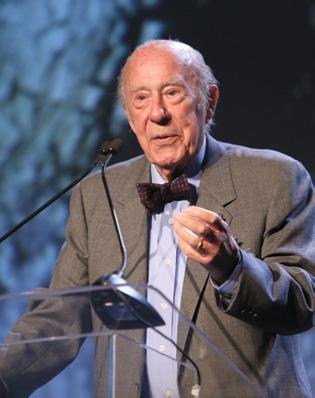
We are pleased to recognize the generous donors to the newly endowed Shultz Scholarship Fund. Former trustee Shultz championed higher education so it is fitting that this fund is dedicated to giving students from communities traditionally unrepresented in conservation fields support and mentorship through college.
In Memory of S.D. Bechtel Jr.
Connie and Bob Lurie
The David and Lucile Packard Foundation
Brayton Wilbur Foundation
MONTEREYBAYAQUARIUM.ORG | 2022 ANNUAL REVIEW
OUR DONORS
Charlotte Mailliard Shultz
Denise Littlefield Sobel
42
Packards’ Circle, continued
Judy and Gary Logan
Linda and Clint Logan
Dean E Lohrenz
Marjorie and Joe Longo
Karen and Howard Loomis
Monica Lopez and Sameer Gandhi
Heather Shermer Lord and Patrick Lord
Tru Love and Stephen Stuart
Deborah Love-Sudduth and Robert Sudduth
Rosa Luevano and Charles Marston
Genevieve Luis
Valera Lyles and Andrew Dobson
Carmel Lynch and Noel Gaynor
D and C Mabey
Jeff Mace
Mackenzie Family Fund
The MacMillan Family
Evelyn and David Macway
Sandra and Thomas Magill
Magnuson Mayo Family
Liz and Mark Maguire
Sally Maier and John Todd
Judy Maller
Cheryl and Robert Mannell
Jennifer and Philip Maritz
Theresa and David Markle
Judith and Frank Marshall
The Matlow Family
Maureen and Tom Matthews
Susan Maxwell and Steven Schow
May Family Foundation
Bethany Mayer and Dale Jantzen
Susan and Richard Mayer
Mary and Thomas McCary Family Foundation
Margaret McDowell and James Grossman
Madeline and Jennifer McFeely
Dr. Margaret R. McLean
Vera and Andrew McLean
Amanda and David McMillan
Marcia McNutt and Ian Young
Judith and Andrew Mendelsohn
Antonette and Wendell Mendoza
Sharon and Stan Meresman
Frank, Elizabeth, Charles and Robert Meyer
Samantha Michel and Adam Driscoll
Roberta Miles and John Kehne
Carolyn and Dennis Miller
Dennis and Teri Klein Miller
Karen and Roger Miller
Norah and Dave Miller
Susan and Carl Miller
Sharon and David Minch
Wendy Mines and Eleanor Sue Miracles Unlimited, Electrical Engineering
Judith Mitchell
The Mocettini Shimamoto Family
Rebecca and Frank Mock
The Reginald C. Mohun Family
Karen Mokrzycki and Eric Baker
Steve and Linda Monosson
Vicki Moore
Wendy and Robert Morehouse
Connie Morgan and Katie Parker-McDonald
The Larry Morrissey Family
Melinda Moses
Kelly and Brian Mulvey
Heather Murphy and William Ivie
Mary and Kevin Murphy
Judy and Paul Myers
Susan and John Myers
Susan and Robert Myers
Margot and John Nack
Yumi Nakagawa and Paul Bartlett
Maki and Michael Nakashoji
Jan Nash
Radha Nayak and Chris Dowd
LeRoy Nelson
Antje and Paul Newhagen
Amy Ng and Jason Bau
Anais C. Nguyen and Michael P. Lepisto
Nibbi Family
Laura and Jeremy Nichols
Sean and Eric Nierat
Andrea Noble
Nicole and Ryan Null
Ken, Loretta, Julia, Alex and Annelise Nussbacher
Amanda and Luz Nutt
Anne and Tsuneo Oda
Janis O’Driscoll
Kathryn and Harold Ogden
Lily and Greg Ogden
Wendy Okafuji and Michael Hurtado
Mary and Dennis Okamura
Lisa and Scott Olle
Bea and Kevin Olsen
Ruthann Olsen
Lorraine and Thomas Olson
Carra O’Neal and Matt Messana
Fane and Corie Opperman
Nathan and Miles Orloff
Windy and Scott Orviss
Ellen and Gary Osheroff
Joanne Ottaviano and Shaun Mccarthy
Laura and Tom Overett
Janet and David Owen
Hosahalli and Ganga Padmesh
Christopher and Donna Paisley
Alexandra and Jason Panzer
Kimberly and Gary Parker
John, Cathy, Shelly and Tina Parks
Marcia G. Parsons
Cheryl Paterson and Annette Cook
David Patterson
Dana and Andrew Paulsen
Marie Pavish and Bill Deutsch
Jane and Richard Peattie
Cynthia Pensinger
The Perkins Family
Kirk A. Pessner and Russell H. Miller
Candice Philbrick
Chase Phillips and Joyce Chen
Liz and Mike Phillips
Jeff Pierce and Katherine Degelau-Pierce
Rachelle and James Pierce
Julie Pietrantoni and Richard Cline
Judy Player
Sandra J. Plewa
MONTEREYBAYAQUARIUM.ORG | 2022 ANNUAL REVIEW
43
Packards’ Circle, continued
The Poncetta Family
Cindy and Randy Pond
David Pope and Angela Hexum
Nicole and Michael Powers
The Prelle Family
Heather and Delores Preston
Katherine and Milton Primas
Frank Priscaro and Annie Berlin
Peggy Radel and Joel Myerson
Carol Randle
Marjorie Randolph
Marnae and Nicholas Rathke
Jen and Sam Rawlins
Susan and John Ray
Marnie and Steve Raymond and Family
Julie and Howard Read
Denise Reagan and Thomas Merritt
Sandra Reece
Carla Reeves and Dustie Burley
Deborah Reiling
Ellen Duff Richardson
Betty and Bob Ricks
Betsy Riker and David Smith
Vicki and Miguel Rivera
Estate of Debra Essenberg Rober
Beth and Stephen Robie
Kelly and Amanda Roche
Sally-Christine Rodgers and Randy Repass
Matthew Rogers and Swati Mylavarapu
Precilla Rojas and Nicolas Sylvain
Mary Rooney-Zarri and Philip Zarri
Monica and Marc Rosoff
Lynne and Jack Rosser
Jay Rossi Family
Catherine Rossi-Ross and Mark Ross
Karen and Dave Rossum
Susan Roux, MD
Roberta and William Rowan
RSF Global Foundation
Rudolph-Cluff Family
Elese and James Rundel
Carey and Scott Rutigliano
Jean David Ruvini
Kathy and Steve Ryan
Holly Jill St. John and Paul Mackley
Trudy and Charles M. Salter
Joyce and Reid Samuelson
Jaime and Crystal Sanchez
Roberta Santiago and David Swanson
Jeannette Saporito
Jack Schiffhauer
Sheila and James Schlee
Nicole and Nick Schluchter
Generosity unleashed through livestream
Many people who visited the Aquarium as children are inspired to give back as adults. One example is Douglas Wreden, who visited many times during his childhood. He still has a connection with us — and especially with 23-year-old sea otter Rosa. Today he’s the popular personality “DougDoug” on the Twitch livestreaming platform and on YouTube. For three years, he’s hosted livestream celebrations for Rosa’s birthday. Last year, over 77,000 people joined him. Fans made Rosa-inspired art, completed video game challenges, and collectively raised an astonishing $104,350 for the Aquarium! This joyful virtual birthday party is a heartwarming example of how one child’s experiences can inspire the support of a community years later.
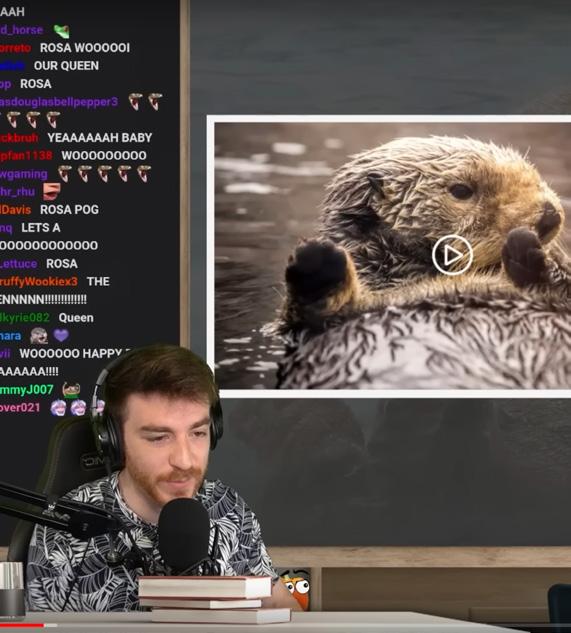
MONTEREYBAYAQUARIUM.ORG | 2022 ANNUAL REVIEW
OUR
DONORS
44
Packards’ Circle, continued
Sam Schreiber and Zoe Fenson
Patricia and Bruno Schueler
Christina M. Schulman
Virginia and William Shultz
Leah Schutt
Christopher, Emily, Ally, Everett, and Sawyer Scott
Liane and Eric Scott
Curtis Scribner
Jennifer and Jeremy Seeba
Jerry M. Seibert Family
Joyce Selby Family
Danielle and Christopher Severs
Megan and Joshua Shaffer
Diane and Carl Shannon
Bonita G. Shaw and Chris Ellis
Sheathing Technologies, Inc.
Dennis and Amy Shen
Manuel C. Simas
Laura and Doug Simcox
Joanne Barnes Smalley
Julie D. Smith
Mary Ann and Andrew Smith
Joseph Sokol
Patricia and Icarus Sparry
Jacqueline A. and John S. Spaulding
Joan and Bruce Spicer
Mark, Suzanne, Rachael and Erin Spradley
Margaret Spring and Mark Bunter
Anja Stadelhofer-Walsh and Timothy Emil Walsh
Brian Stanley
Chuck Steele and Jolena Betts
Allison and Christopher Stegge
Deborah and Thomas Stephenson
Jennifer Stern and Jeffrey Pugh
Scott Stevenson
Sibylle and Heinrich Stockmanns
Becky Stromska-Green and Steven Green
The Strong Family
Sheri and Todd Suko
Junie and John Sullivan
Summers Family Fund
Janet and Worth Summers
Marilyn Sutorius and Pamela Jungerberg
Valerie Swalef
Hayley and Christopher Swann
Debra and Keith Sweitzer
Pamela and Edward Taft
Cheryl and Trent Tanaka
Arleen and Bill Tarantino
James and Di Ann Tarhalla
Alice and Bill Taylor
Jane and Paul Taylor
Elisa and Christina Tempelaar-Lietz
Sarah and Jay Thayer
Sonja Thieme and Joerg Meyer
Sally Tischler and Jim Newsome
Davis L. Todhunter
Maureen Tolson
Megan and Benito Torres
TOSA Foundation
Maria and Matt Tracy
Binh and Don Tran
Onnolee and Orlin Trapp
Madison and Edward Trathan
Colin and Rebecca Tribble
Russell R. Tripp
Nancy and Rich Trissel
Tina M. Tuma and Gilbert Chang
Henry H Ushijima
Sylvia and Paul Van Diemen
Diane Van Maren
Matthew Vargas and Chiao Ning Liu
Mary Ann Vasconcellos
John Venneman and Laura Kidwiler
Jerrie Villegas
Mary Vinciguerra and Gail Pinnell
Linda Wade and Jon Monteith
Ingo, Gabriele, Finn, Janne, and Noah Wald
Scott Walecka and Martha Seaver
Denise Watkins
Sean Wang and Wei Lei
Weimin Wang and Runxiang Lu
Gail and Bob Ward and Family
Molly and Maxwell Warner
Lucinda Watson
Jennifer and Chris Watts
Brenda Higgins Webster
Rebecca and David Weekly
Sandra and Keith Wells
Dr. Rick and Judy Wentworth
Beth White and Curt Huber
Belle, Caroline, and Oliver Whitehead
Michelle and Greg Whitten
Stephanie Wien
Linda and Randy Wight
Emily and Edward Wilbur
Anne Mary Wilke
Williams Family Giving Fund
Jeanne and Michael Williams
Lesley and Greg Williams
Dr. Quentin Williams and Dr. Elise Knittle
Wanda and Eddie Willis
Todd and Erin Wilms
Sandy and Marc Wilson
Wings Up Family Foundation
Susan and Peter Wolcott
Larry E. Wolinsky and Amerian D. Sones
Joyce and Kenneth Wong
Penny and Warren Wood
Kathryn and Robert Woolery
Jerry and Sheila Wroblewski
Linda and David Wyckoff
Rhea Yap and Steve Cheng
Joann Yates and William King
Frances Yee and Lillian Johnson
Ellie Y. Yieh and Michael J. Sullivan
Katie and Michael York
Lynn and Kyle York
Gail and Richard Youngblood
Kathy and John Youngblood
Scottie Zimmerman
André, Kathleen and Jennifer Zunino
*Gifts made from a donor-advised fund at the Community Foundation for Monterey County.
MONTEREYBAYAQUARIUM.ORG | 2022 ANNUAL REVIEW
45
Institutional Contributors and Business Members
$100,000 and above
Community Foundation for Monterey County
Environmental Defense Fund
Google
Monterey Peninsula Foundation, host of the AT&T Pebble Beach Pro-Am and Pure Insurance Championship
Impacting the First Tee
Multiplier
Nestlé Purina PetCare
$50,000 and above
Anonymous
U.S. Fish and Wildlife Service
$25,000 and above
The Elfenworks Foundation
MFactor
Microsoft Corporation
National Fish and Wildlife Foundation
Otto Construction
$10,000 and above
Agilent Technologies
First Tech Federal Credit Union
Flagship Restaurant Group
Granite Construction
Intel Corporation
MUFG Union Bank Foundation
In honor of Dr. Emeka Nchekwube, MD
Netflix
NVIDIA Corp.
Ocean’s Halo
Oceano Azul Foundation
Pacific Gas and Electric Company
Pebble Beach Company Foundation
UC Components Inc
$5,000 and above
Adobe Inc.
Advantech Corporation
Aldridge Construction
AmazonSmile Foundation
Frank M. Booth Inc.
Chambers & Chambers
Chevron
Cisco Systems Foundation
Finch Montgomery Wright PC
InterContinental
The Clement Monterey
Intuitive Surgical
Johnson & Johnson
Kain Yi Dental Corp
Mage Technologies
OtterSoft Technologies
RSO Foundation, in honor of Richard and Shirley Otto
2022 ANNUAL REVIEW CREDITS
MANAGING EDITOR: Valerie Thomas
EDITORS: Karen Jeffries, Ken Peterson
CONTRIBUTORS: Kera Abraham Panni, Corbett Nash, Kasey Rahn, Jenny de la Hoz
VICE PRESIDENT OF DONOR RELATIONS: Soo Dean
DESIGN: AgileCat
PHOTO CREDITS
Trinity Fruit Company, Inc.
Trinity Packing Company, Inc.
VMware
Walt Disney Company Foundation
$2,500 and above
The Bank of America Charitable Foundation
The Boeing Company
Genentech
IBM
Illinois Tool Works Foundation
LinkedIn
Minnesota Zoo Foundation
Monterey Marriott
Monterey-Salinas Transit
The Morrison & Foerster Foundation
Nordic Naturals
Paradigm Winery
PayPal
Portola Hotel & Spa
Salesforce
Scheid Vineyards
State Farm
Monterey Bay Aquarium/Presley Adamson (5 left), Courtesy of Drew Altizer Photography (3 bottom), Monterey Bay Aquarium/Nina Arias (13 middle), Courtesy of California Department of Justice (17), Ann Caudle (22 bottom left illustration), Courtesy of Sarah Bonner family (35), Courtesy of CSUMB/Andrew Morgan (13 top), Courtesy of DougDoug (42), Monterey Bay Aquarium/Manny Ezcurra (15 bottom middle), Monterey Bay Aquarium/Katie Finch (25), Monterey Bay Aquarium/Erin Lenihan (15 top, bottom right), Monterey Bay Aquarium (31 bottom), Courtesy Monterey Bay Aquarium Research Institute/National Oceanic and Atmospheric Administration (18), Monterey Bay Aquarium/ Kathleen Olson (36), Diane Rome Peebles (22 bottom right illustration), Monterey Bay Aquarium/Richard Pharaoh (6 top and bottom), Monterey Bay Aquarium/Tyson V. Rininger (cover, contents, 2, 3 all except bottom, 4, 5 right, 6 middle two, 7, 8, 9, 10, 11, 12, 13 bottom left, 14, 24, 26, 27, 30, 32, 45, back cover), Courtesy of Seafood Watch/Monterey Bay Aquarium (16, 20, 21, 22 top, 23), Monterey Bay Aquarium/ Karen Tuttle (15 bottom left), Courtesy of U.S. Navy/Mass Communication Specialist 2nd Class Justin Stumberg (19 left), Courtesy of Joan Weber and Alan Feinberg (31 top), Monterey Bay Aquarium/Randy Wilder (19 right).
MONTEREYBAYAQUARIUM.ORG | 2022 ANNUAL REVIEW OUR DONORS
46
Join a donor circle
Support from annual donors allows us to tackle the most pressing threats to ocean health.
Become a member
Enjoy great benefits while supporting the Aquarium’s work to inspire ocean conservation and protect the ocean for generations to come.
Give through your donor-advised fund *
You can recommend a gift to the Aquarium from your donor-advised fund by contacting your donor-advised fund representative. *
Make a gift with a charitable IRA rollover *
If you are 701/2 years old or older, the IRA charitable rollover allows you to make tax-free charitable gifts of up to $100,000 per year, directly from your IRA to the Monterey Bay Aquarium. *
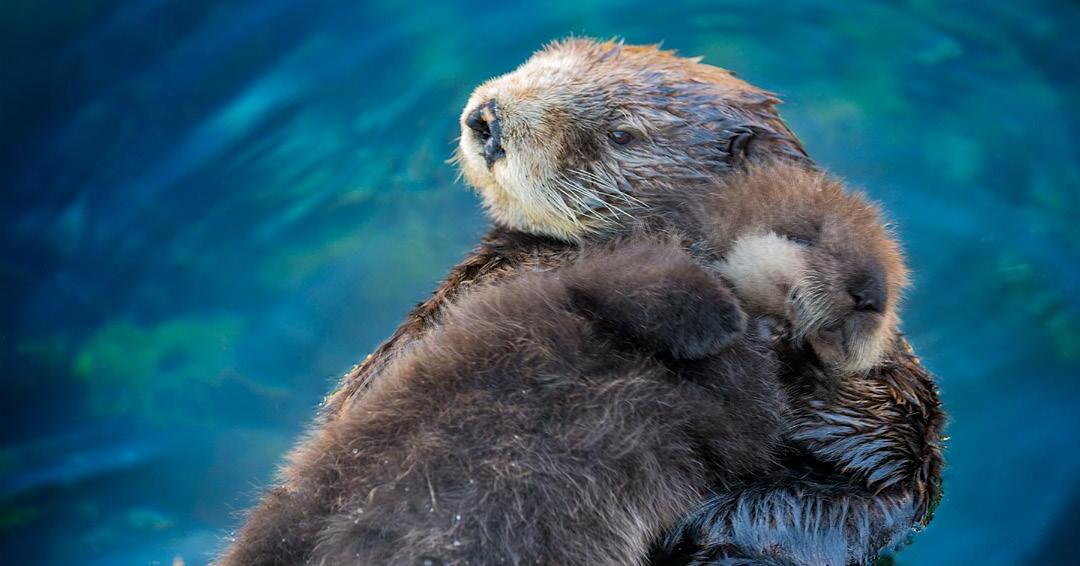
Talk to your employer about matching your gift
Many employers match gifts made by their employees, some match gifts made by their retirees, and some match employees’ volunteer hours. This is a wonderful way to double or even triple your support.
Become a business member
Join a community of like-minded businesses committed to a world with a healthy ocean while enjoying special access to the Aquarium’s world-class visitor experiences.
Join our Betty White Ocean Legacy Circle
Include the Monterey Bay Aquarium in your estate plan by making a bequest through your will or living trust for a specific amount, a specific asset, or a percentage of your estate.
Grow the Aquarium’s endowment
Provide long-term support for the Aquarium’s education initiatives and conservation and science programming. Individuals who give $100,000 or more become part of our Endowment Society.
Honor someone with a gift in their name
Make a memorial or tribute gift to honor a loved one or to celebrate a special occasion — such as a birthday — and extend their legacy.
Ways to make a donation
• Make a secure donation online at MontereyBayAquarium.org/SupportNow
• Give us a call at 831.648.4880
• Send us an email at donors@mbayaq.org
• Send a check to:
Monterey Bay Aquarium Attn: Development Office 886 Cannery Row, Monterey, CA 93940
For more information about supporting the Aquarium, please visit:
MontereyBayAquarium.org/SupportNow
MONTEREYBAYAQUARIUM.ORG | 2022 ANNUAL REVIEW
* Per IRS tax requirements, there are restrictions to guest cards. Please contact us for more information and your options.
You play a critical role in helping us inspire conservation of the ocean. There are many ways you can provide support.
47
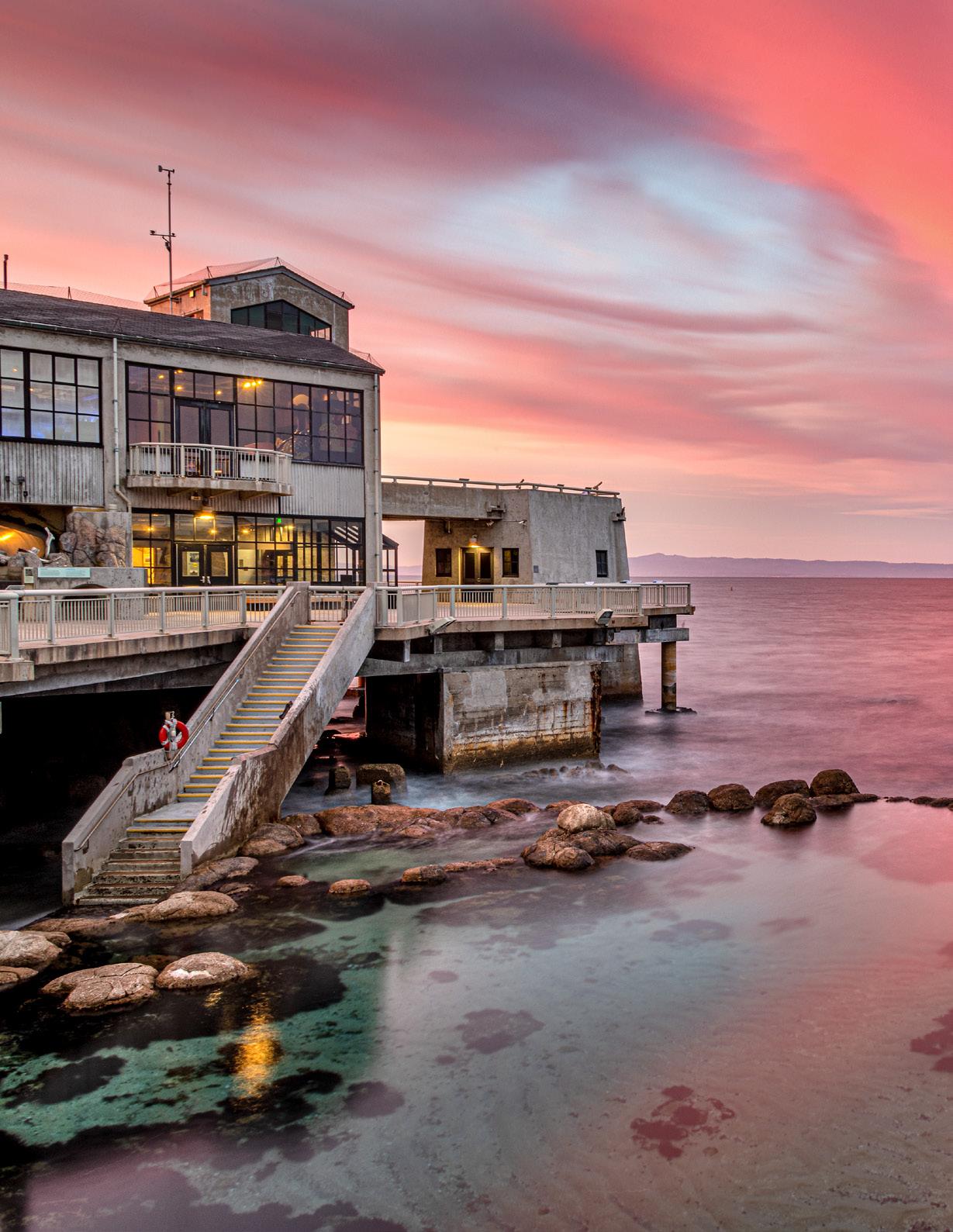
886 Cannery Row Monterey, CA 93940 831.648.4880
Our mission is to inspire conservation of the ocean.

 Front cover: Purple-lipped jelly Earleria purpurea
This page: Scalloped hammerhead shark Sphyrna lewini and school of Pacific sardines Sardinops sagax
Front cover: Purple-lipped jelly Earleria purpurea
This page: Scalloped hammerhead shark Sphyrna lewini and school of Pacific sardines Sardinops sagax




























 Aquarium educator Beth Callaghan welcomes educators to the summit.
Aquarium educator Beth Callaghan welcomes educators to the summit.









 — Martin Gil, sophomore
— Martin Gil, sophomore



















 STEPHEN C. NEAL Board Chair
Julie Packard, Executive Director
Stephen C. Neal, Board Chair
STEPHEN C. NEAL Board Chair
Julie Packard, Executive Director
Stephen C. Neal, Board Chair
























